April 19, 2014.
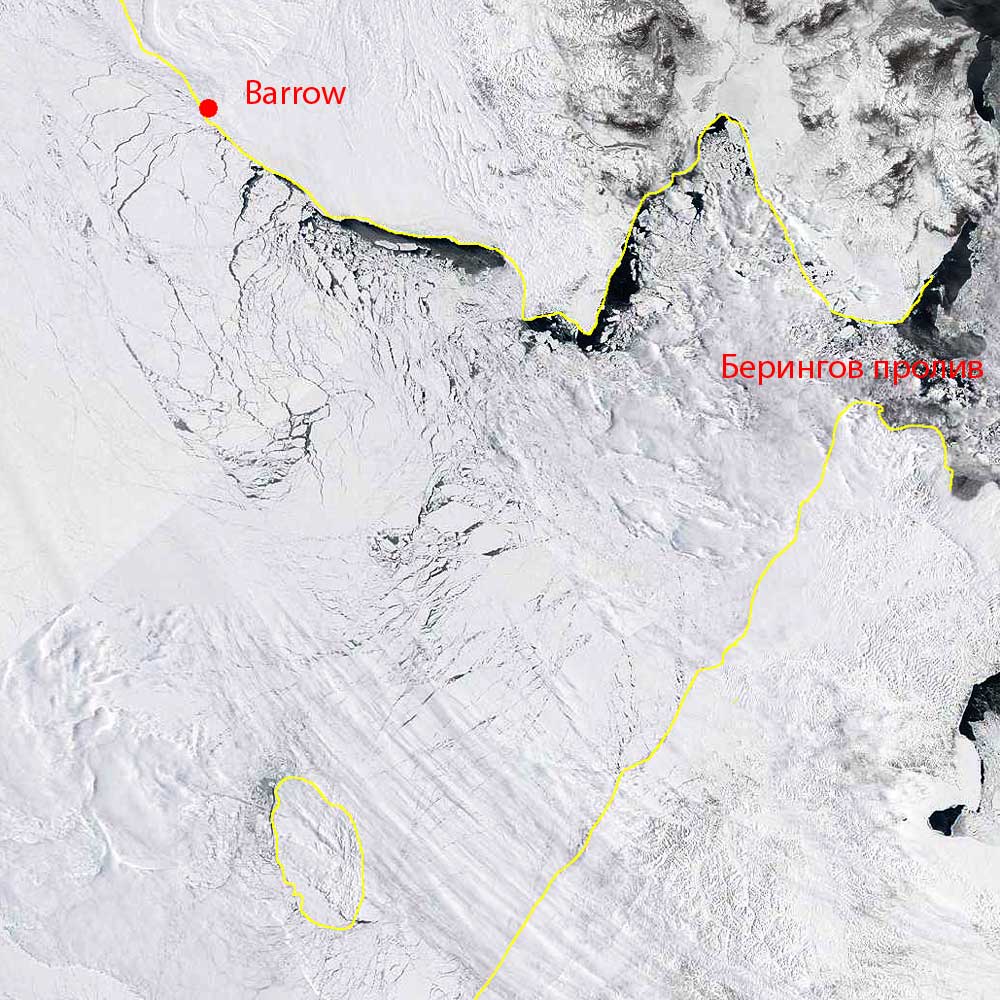
We are at Barrow; the expedition is interrupted due to falling behind schedule and quite complicated condition of ice in Bering Straight. V.Ye.
April 17, 2014.
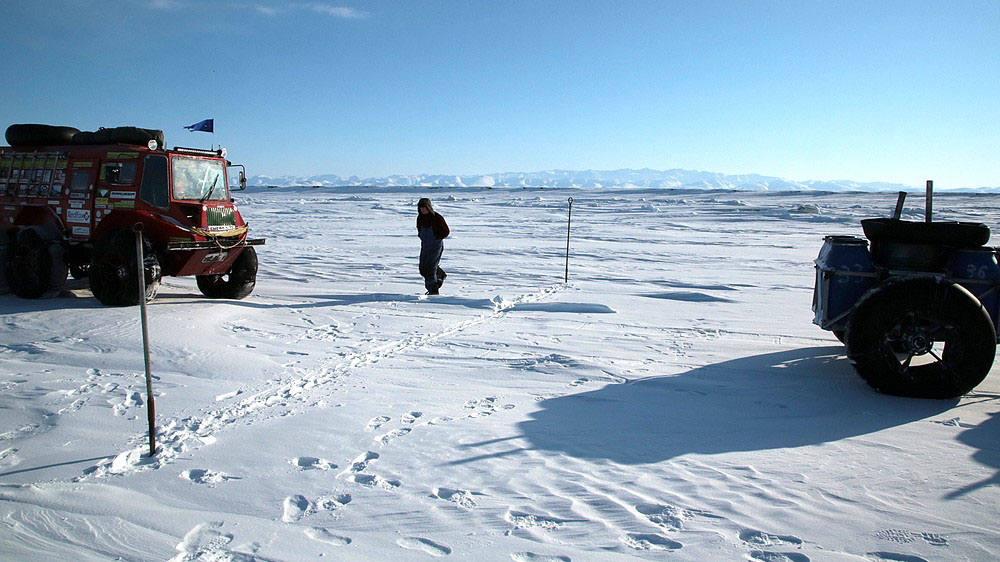
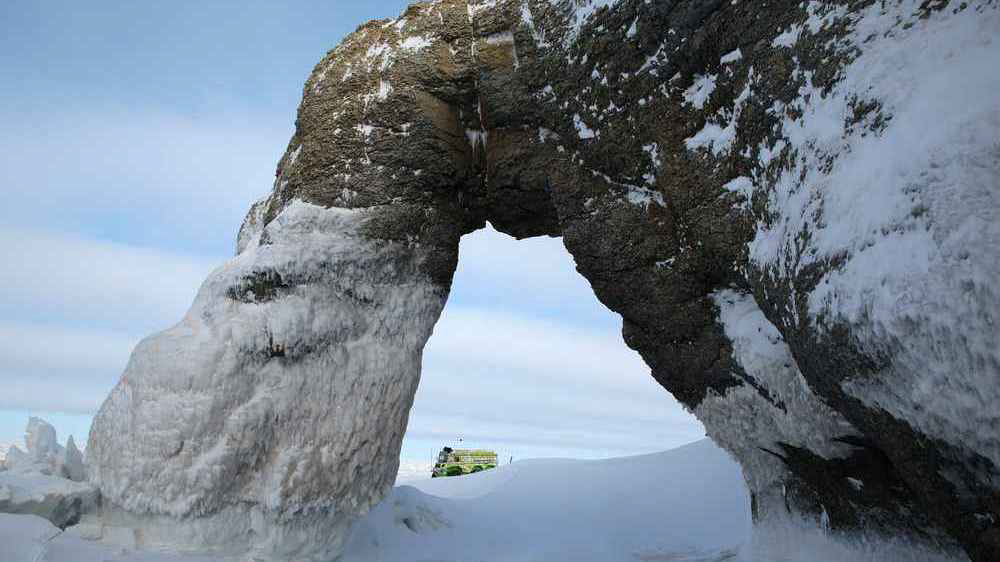
Coordinates 70°48,318N, 152°10,257W. Odometer reading 3430 km. Distance to Barrow 220 km. After our departure from ExxonMobil oilmen, the route is quite monotonous; we passed several artificial islands where hydrocarbon extraction is in progress or preparation for extraction are made. There are many bear traces – large, small and tiny ones. Numerous mother-bears have gotten out of the lairs, they abide to proper order, all of them procreate their offsprings in spring, unlike us - at sixes and sevens. The coast, in contrast to the Canadian coast, is much more inhabited. At daytime it is not very noticeable, but in the darkness all these drill sites, or rather their lights, are visible at a distance of 30 kilometers, maybe even more. The tires are badly worn, their service life spent in cold and under extreme loads comes to an end. The resource of a tire is not very large, about 10000 km or a little more. Repairing them takes a lot of time: at first gluing up, then inflating; though it is useful for health – every hour (or maybe every two hours) to leap out and to work with the pump actively. For medical indications, electrically driven air compressors are not welcomed here, as well as soft seats for the driver and for other crew members; as the result, we have no radiculitis. Very effective remedies. It is warm, the humidity has increased. Yesterday evening we met a problem – the windshields are icy from the outside. The wipers do not help, neither does air blowing from the inside: the windows are double-glazed. That is how matters stand. Greetings to all, and till next communication session. V.Ye.
April 14, 2014.

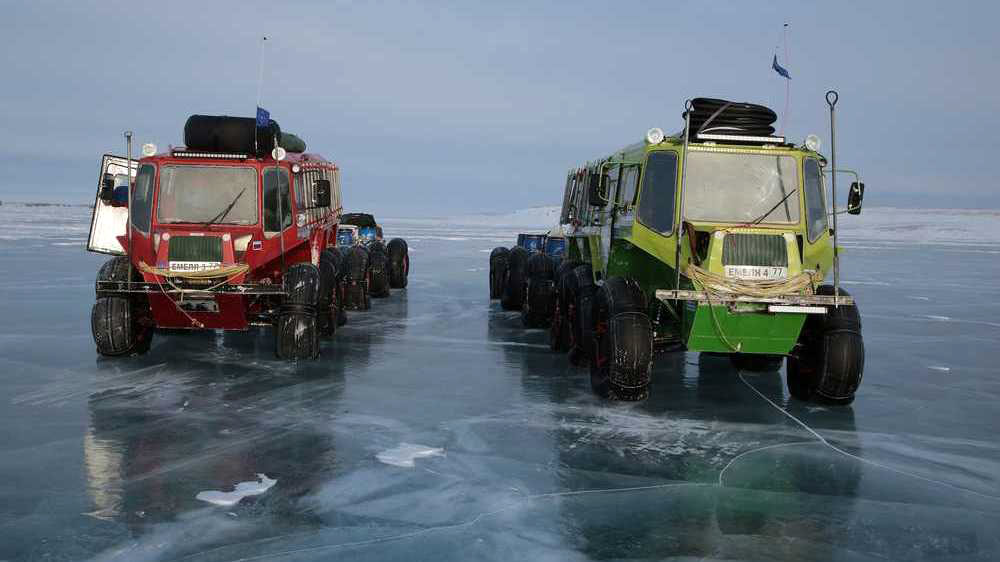
Odometer reading 3180 km. Last night we lodged at ExxonMobil base. Coordinates: 70°10,180N, 146°15,320W. The base is large; they are constructing a gas pipeline. We met an exceptionally friendly welcome; shower, laundry, meals, workshops of any kind, materials, just human sympathy, - very sincere and benevolent people. The senior staff - Mike Brown, Randy Greenway, Mike Watson, Bill Church and others – did their best to help us. Everything around is incredibly clean, in our view - just beyond the limits. Each vehicle is provided with a rubber drip pan which is instantly laid on the ground under the engine during stops, so that NOT A SINGLE oil drop fell on the ground. I am not even speaking about such trifles as the disinfecting solution in a wall-mounted box at the canteen entrance, or expendable PE gloves put on when you gather meals on the tray. When I asked “Is it not too much?” there was a reasonable reply, that they all live in congested conditions, and if anybody falls ill, then many others will fall ill also. Everyone has special chains on the footwear, in order to prevent slipping and falling down. The employees dealing with metal structures have purpose-made chains preventing slippage on metal surfaces. It goes without saying - gym, billiards, etc. Perhaps nowhere else we met such genuine keen interest to our vehicles and route. Several times I opened the flooring in the cabin, demonstrated the transmission, and explained the design of the vehicles. A short video clip was shown on CCTV channel right away. The people are heartily wishing to help you – that was the basic impression we all had after 24 hours spent with the gasmen. Expedition members express heartfelt gratitude to G. Scott Campbell who communicated with the expedition before it had even started, and proposed to partake their hospitality. Many thanks to him and to everybody of the team! The weather outdoors is warm, in the sunlight the temperature grows to positive values, and though the good-minded hosts measure everything in the degrees by Fahrenheit which are unfamiliar to us, – it is useful to train the brain, in any conversation converting kilograms into miles, pounds into gallons, etc. Greetings to all, and till next communication session. V.Ye.
April 12, 2014.
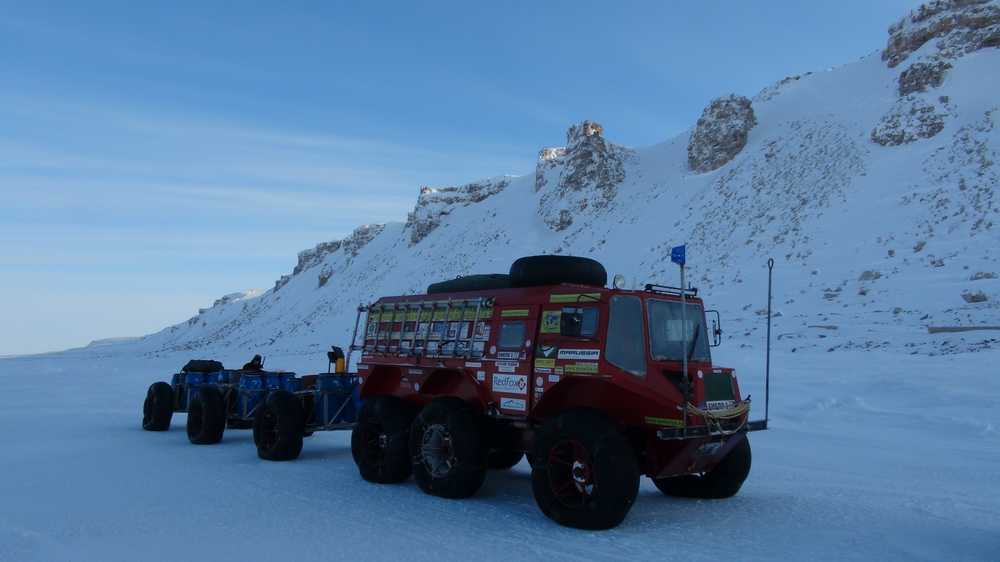
70°05,317'N, 144°01,860'W. Odometer reading 3087km, day’s distance 126km. All day long the weather is clear, windless, we started at 11:00. In the morning we were busy replacing the wheel bearing of a trailer and doing back-up welding of wheel disks which were damaged during last few days due to very harsh road. The whole day the road was not bad, along coast-fast ice. We were driving in shifts, and got a good sleep. We suffer greatly from lack of political briefings - what if the Motherland has increased by some other constituent entity of the Federation!? The distance to the base of ExxonMobil oilmen who had invited us to visit them is still as far as 85 km, but the guys are already wandering, what sort of sauna twigs they have there. Till next communication session, and greetings to all. V.Ye.
April 11, 2014.
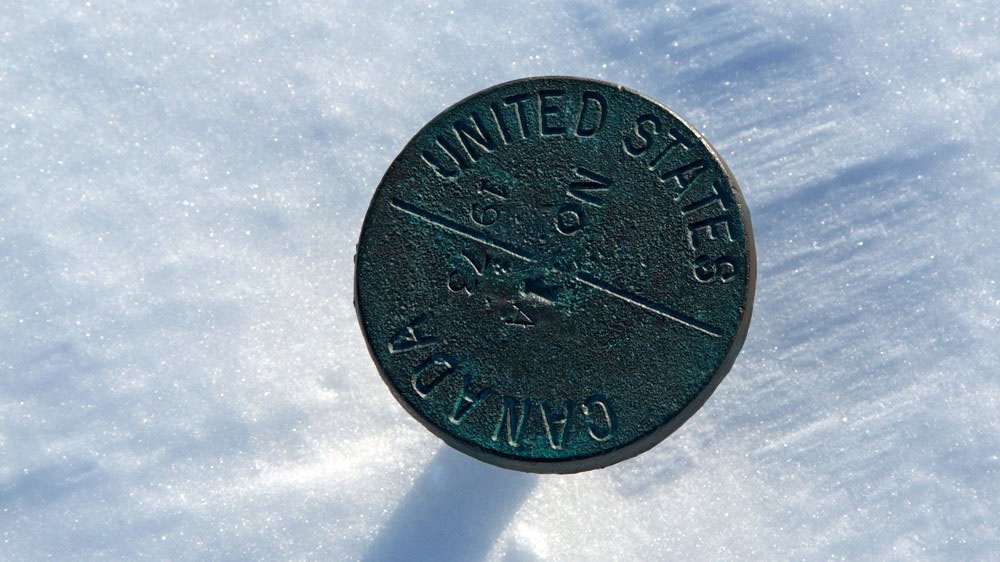
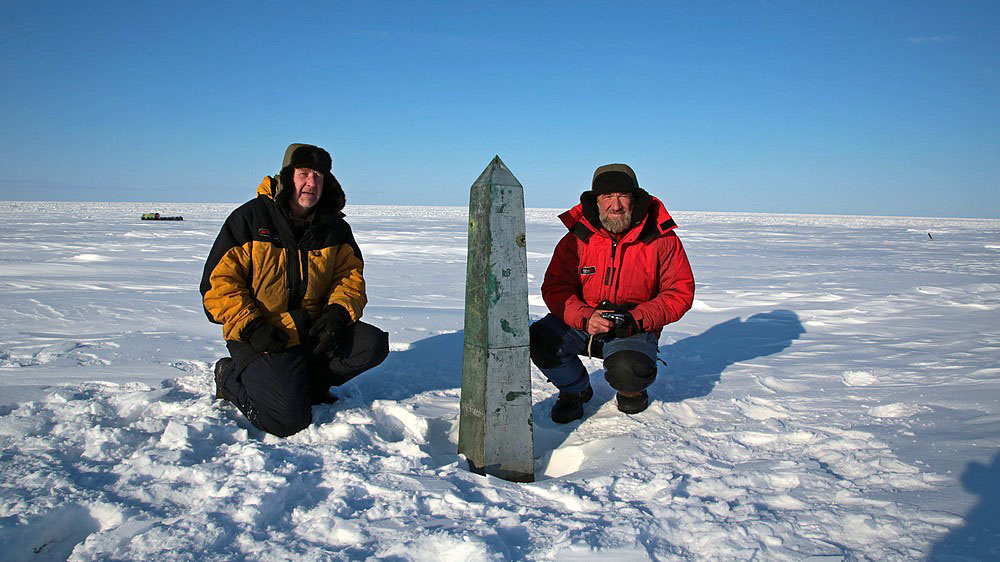
69°41,990'N, 141°19,663'W. Today it became definitely clear that the USA are in concert with Canada: the quantity of ice hummocks did not decrease. The border mark is fine, it stands on the coast, “Canada” is written on one side, “United States” – on the other. Neither machine-gunners at motorcycles, nor barbwire under high voltage, it looks somewhat light-minded. National parks instead of machine-guns are at both sides of the border. Day’s distance about 60 km; whiteout was in the morning; we were busy with minor repair, handicraft, creative work, and sure enough, - struggling with the tracker. It is blinking with lamps as if it were operating, but fails to transmit coordinates into the space. Maybe by the morning it will come to senses, I say to myself at midnight and go to bed. All the best and till next communication session. Yours V.Ye.
April 10, 2014.
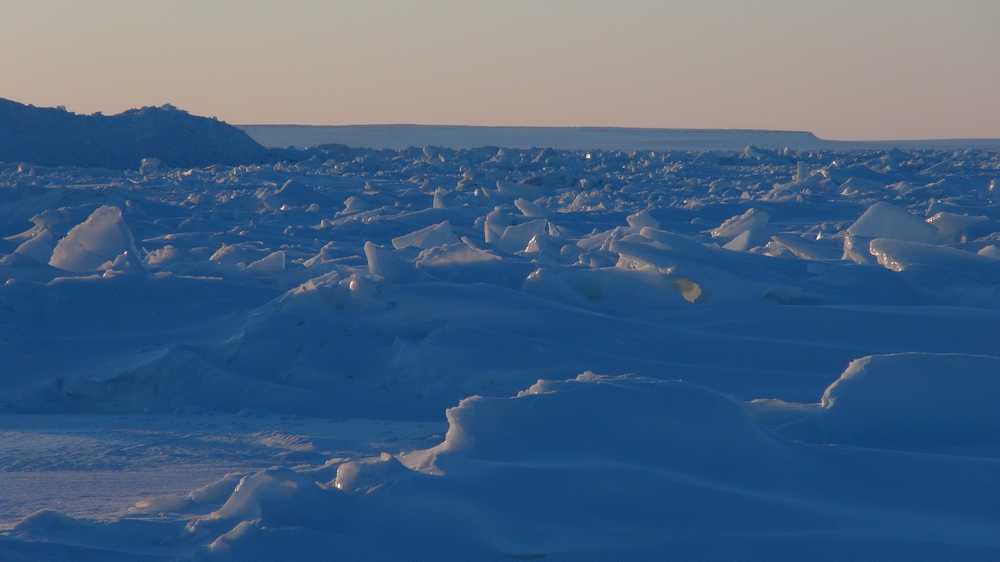

Overnight stop coordinates: 69°37,143'N, 140°03,140'W. Odometer reading 2903 km. Day’s distance 81 km; 70 km passed cheerfully until 14.00, then 10 km all the rest time till evening (22.00), minus three hours spent for replacement of two shock absorbers and a suspension spring at the red vehicle. In the morning before start we noticed a vessel on the horizon, most likely frozen in the ice. All is lost – the pirates, thought we and courageously drove towards the inevitable. The distance to the vessel turned out to be 27 km. It was a floating drilling rig, its board was about 30 meters high. There were nobody on it, obviously they were scared and fled, snowmobile traces were seen around. After taking memorable photos we drive further. For a short while we ride along smooth ice, but then it’s as ever – first gear, unfortunate vehicles-toilers humbly climb over the enormous snow drifts and ice hummocks. The distance from the overnight stop to the border with Alaska is less than 40 km, we hope that tomorrow we’ll manage to cross it. It is still about 700 km to Barrow, if only there were not too many ice hummocks! In the evenings we enjoy sliced frozen fish bought at Tuk from a local fisherman. It was about three times cheaper as compared with price at Vorkuta. But it is a low-lying pleasure; and we enjoy the high-pitched pleasures after supper, for instance, we contemplate the northern lights. But, in all sincerity, we devote ourselves to the high-pitched with less inspiration, and for shorter time. Indeed so. That is regrettable, we cannot collect ourselves and stop thinking about food. Kindest wishes to all, and till next communication session. Yours V.Ye.
April 9, 2014.
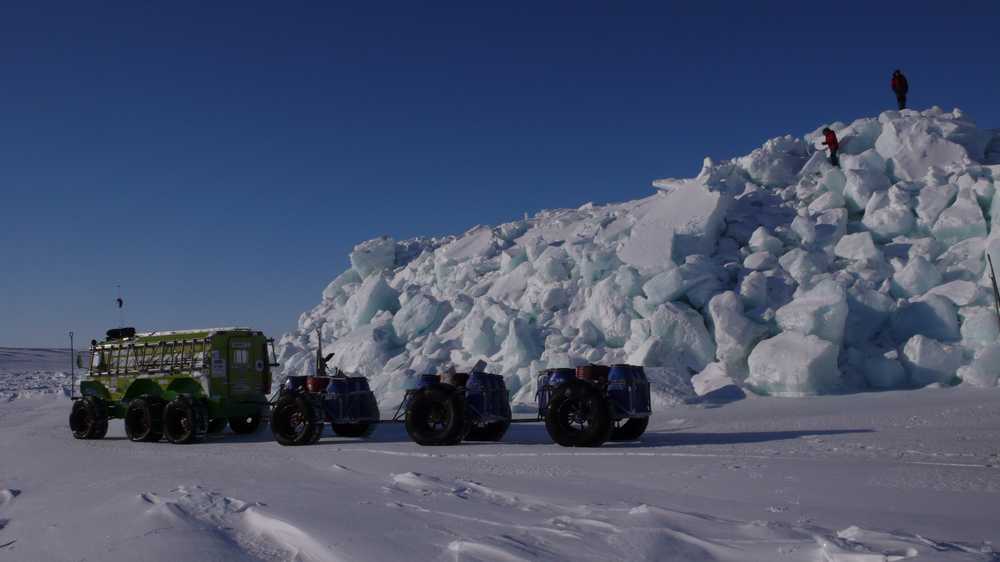
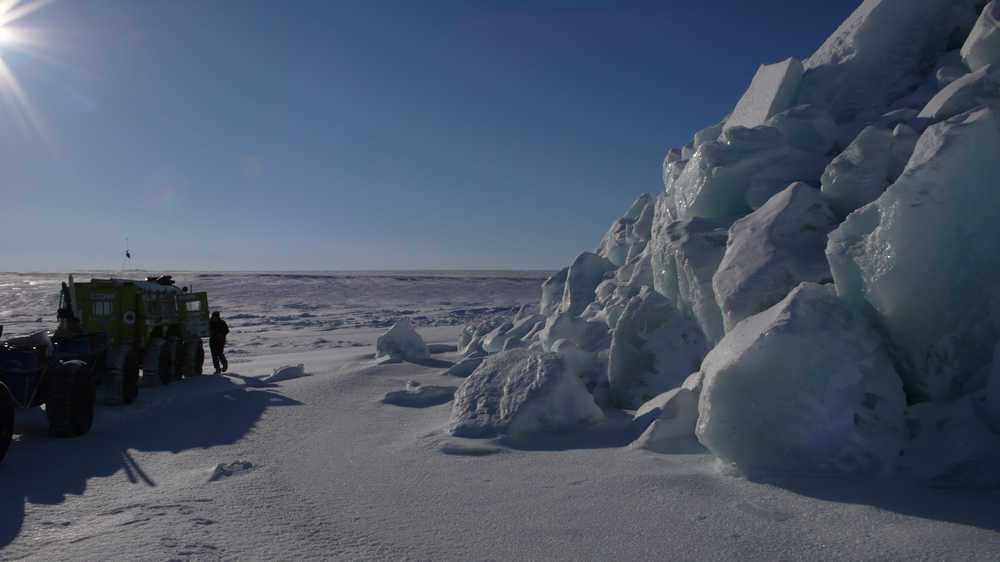
Overnight stop coordinates: 69°18,664'N, 138°20,938'W, odometer reading 2822km, ice condition is good. We started at 8.30, stopped for night stay at 23.00. In the morning we eased up: the day before we had driven till late at night, went to bed at 02.00. In the morning it is clear, moderately windy, -25-27°C. After two hours riding, the tow bar of the rear trailer in the green caravan breaks. Its service life has expired. In 2011 and 2013 the trailers were mercilessly overloaded, and they have enough of it. The majority of repairs in this travel are caused by tow bars and tires. The tracker is tormenting my nervous system. The tracker is a small box which every 4 hours should spit out our coordinates to the global universe. So that everybody knew where to search for us, and not to repeat the story of the steamship "Chelyuskin", when Vasya – a radio amateur from a remote village - by chance heard the signal, notified the competent authorities and the Chelyuskintsy were rescued, the country united still closer around you-know-yourself whom, and generally all of it was entirely positive. Now the times have changed, everybody has no time to bother about such nonsense, when ruble exchange rate is at one moment falling, at another – rising. So, maybe it is easier to notify the interested members of society about coordinates of our night stay locations - and that's all. Less harm for my nerves. The previous two days we did not see any wildlife representatives, but today in the evening we were lucky to watch a she-bear with two cubs. We took photos of the cub's traces, very tiny ones. Again we meet ice hummocks more and more often. About 110 km still remain to the border with Alaska. The final kilometers of the Canadian territory pertain to the Ivvavik national park, therefore, we will travel offshore, watching the bird's and animal's happy life from afar. That's how things are. Yours V.Ye.
April 7, 2014.
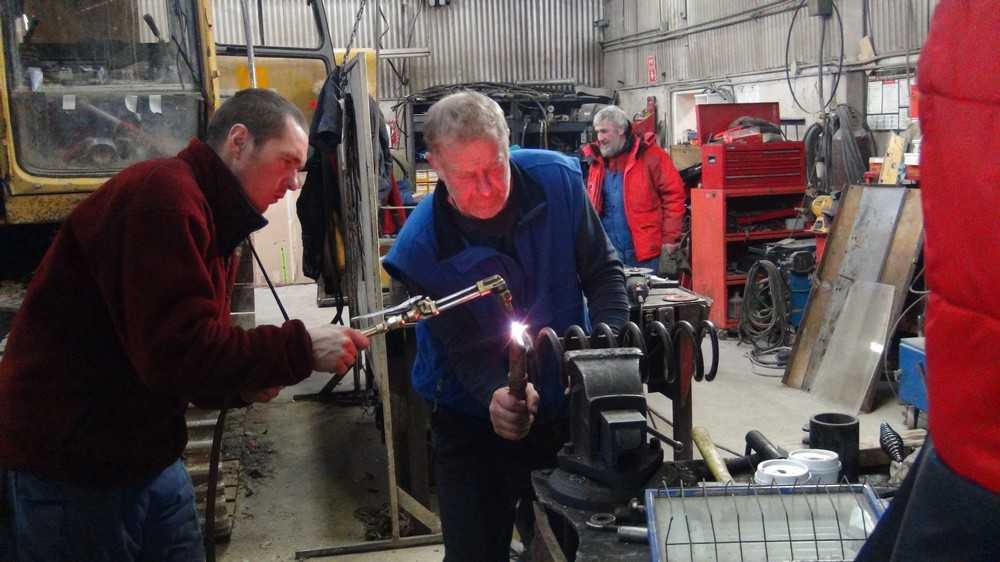

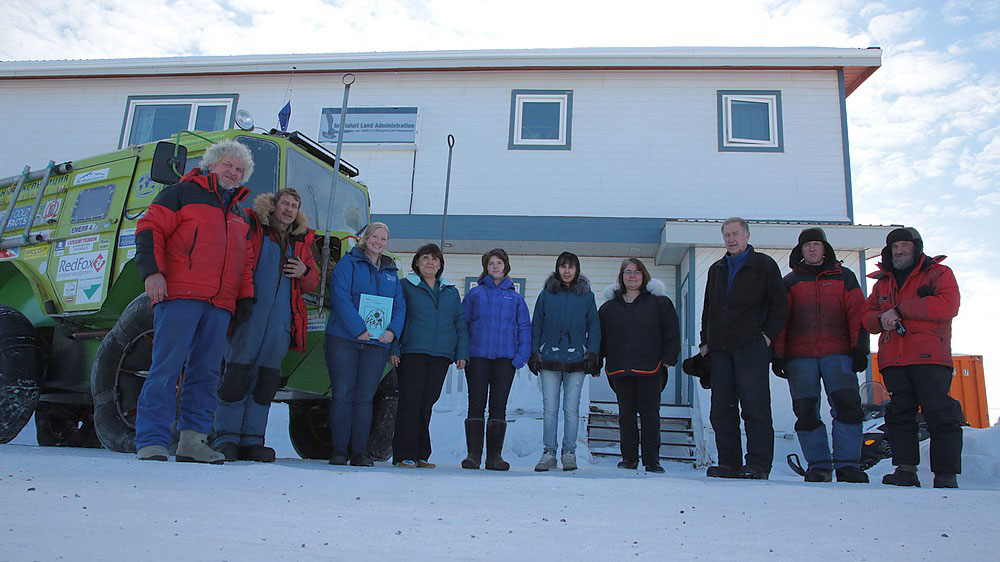
We are at Tuk. We have arrived today early in the morning along the road under construction (25 km). I paid the fee for “more than casual stay” at private lands, obtained the permit, therefore no such problems should occur until the US border. For 50 dollars per pax we bought the right for shower, coffee, cozy accommodation and web access. The freshly-washed gents left for shopping, while I bought some fish from the local people, and now sit and hit the keyboard. The first 90 km away from Tuk we will drive along ice-covered winter road, then we will turn NW to a distributary of the Mackenzie river. When I was child absorbed in books by Jack London, I could not even imagine that some day I will be travelling in these places. It is pity that we have no spare time to visit Dawson, to drop into “Elkhorn” and to swig off a glass of whisky. I wish just to cast a glance with half an eye at the place where Smoke Bellew with Shorty and Burning Daylight had a good time. Alas and alack, time is not waiting, as well as the Bering strait. We are behind schedule, and have to hurry. The weather is sunny, windless, and warm. I have got fish from the local people today, all team members are craving for sliced frozen fish. The plain and simple inn where we stay is admirably decorated by old boats, stag-horns, the wolf skin on the wall near the entrance is of astounding size, as well as the stag-horns. And the view on the ocean with ice road to the horizon. On our way we saw an original method for winter storage of motor boats: the owner simply leaves it on the coast together with the outboard motor; by all appearances, in spring he finds everything at the same place, pulls the string, starts the motor and departs. Seeing it, I just feel ill at ease. It is improper to live in such a manner. It makes one too flaccid.
Greetings to all and till next communication session. V.Ye.
April 5, 2014.
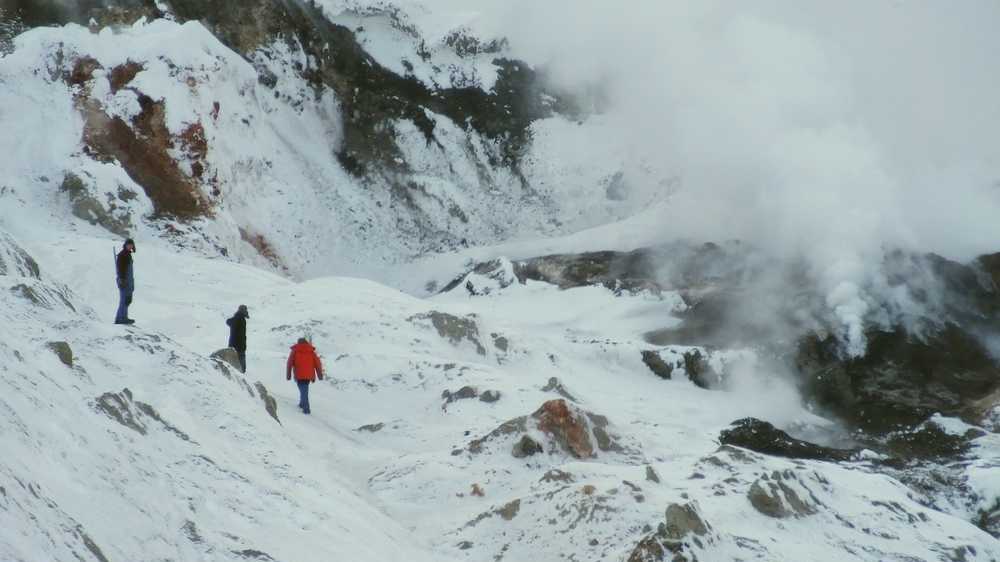
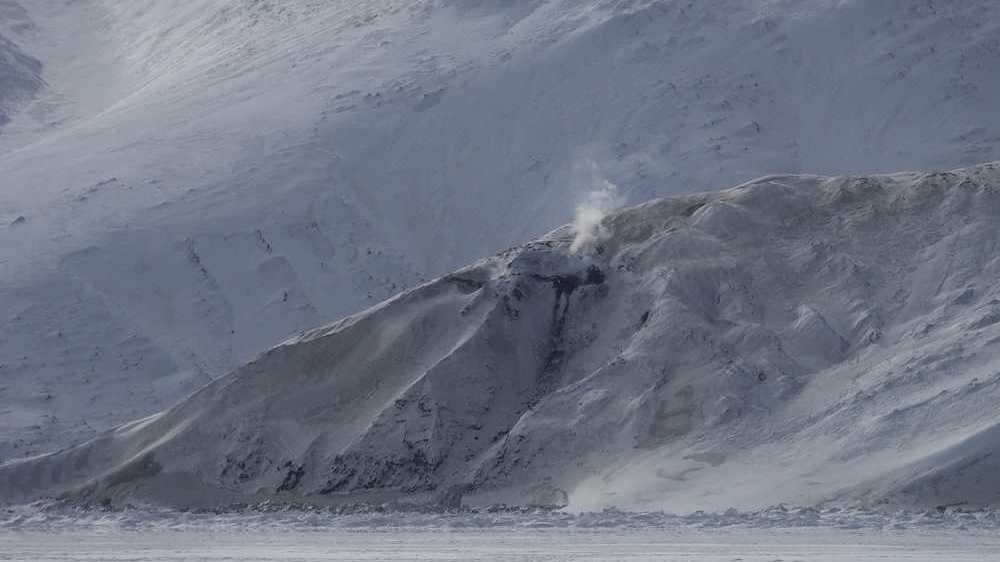
The weather is fine - no wind, during daytime it is rather warm, unlike Moscow, where, according to rumors reaching us, severe springtime winter came back. We travel along Liverpool bay to Tuktoyaktuk. The snowmobile path is guiding us, we are just driving and gazing around. Yesterday we saw two foxes, with chic fur coats, dark-red-and-black. The couple was actively arranging personal relations, not paying the slightest attention to us. It becomes a common rule here, perhaps the point is that we are gradually becoming a part of local nature? The only exception was the yesterday’s she-bear running away with two tiny bear-cubs. They were falling behind the unduly nervous mummy, and in order to increase speed she carried them by the scruff of the neck in turns. Numerous herds of musk buffalos are wandering at mountain slopes; the appearance of ptarmigans cause permanent salivation. But we clench our teeth and confine ourselves to macaroni and buckwheat. Nothing doing, sufferings help sublimation. Tomorrow we expect arriving to Tuk, buying foodstuff, sending photos and moving further on straight away. We have plenty of fuel, for about two thousand kilometers distance. When riding along snow with small erosion ridges, consumption decreases to 25 l/100 km. A snowmobile with sledge has the same fuel consumption. During daytime the sun is shining intensely, we open ventilating windows in the vehicles, stay in T-shirts only. When we recall families and friends freezing in Moscow, tears are coming to eyes; hold on, dear friends! All the best, and till next communication session. V.Ye.
April 2, 2014.
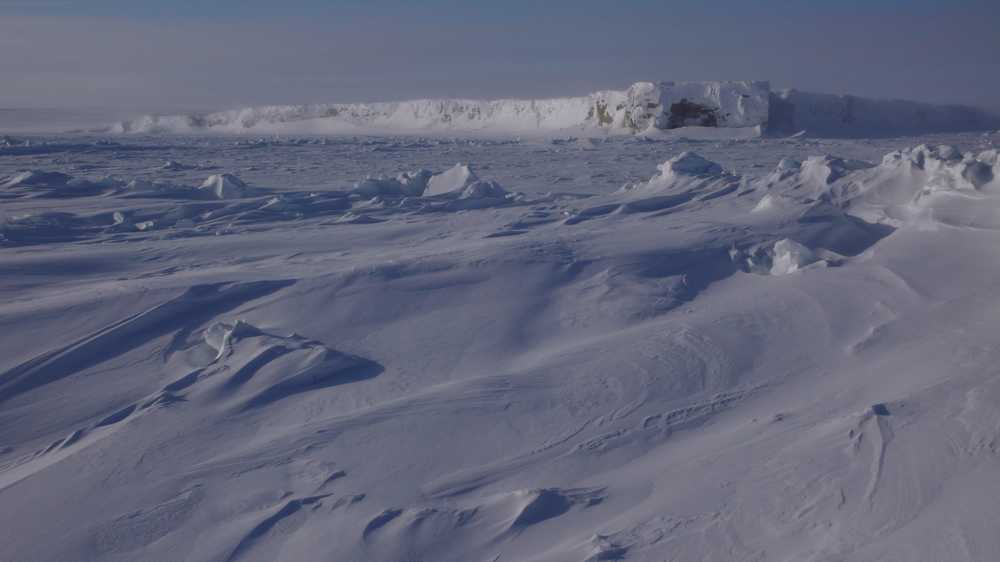
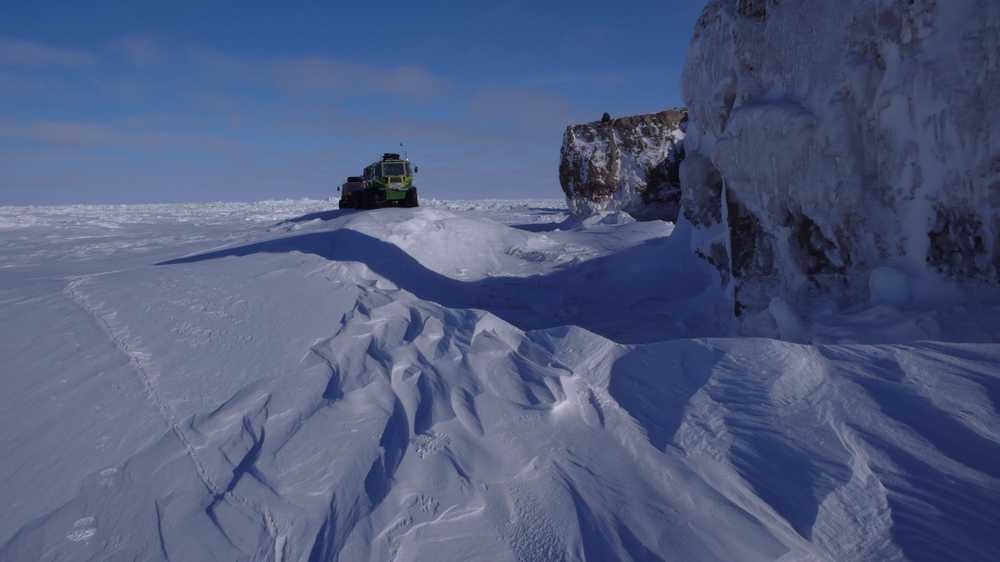
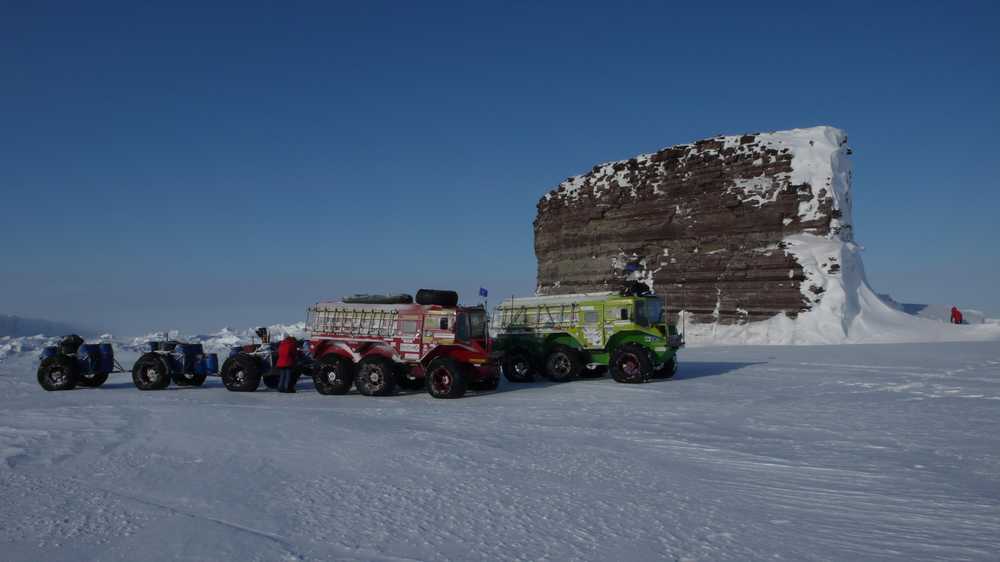
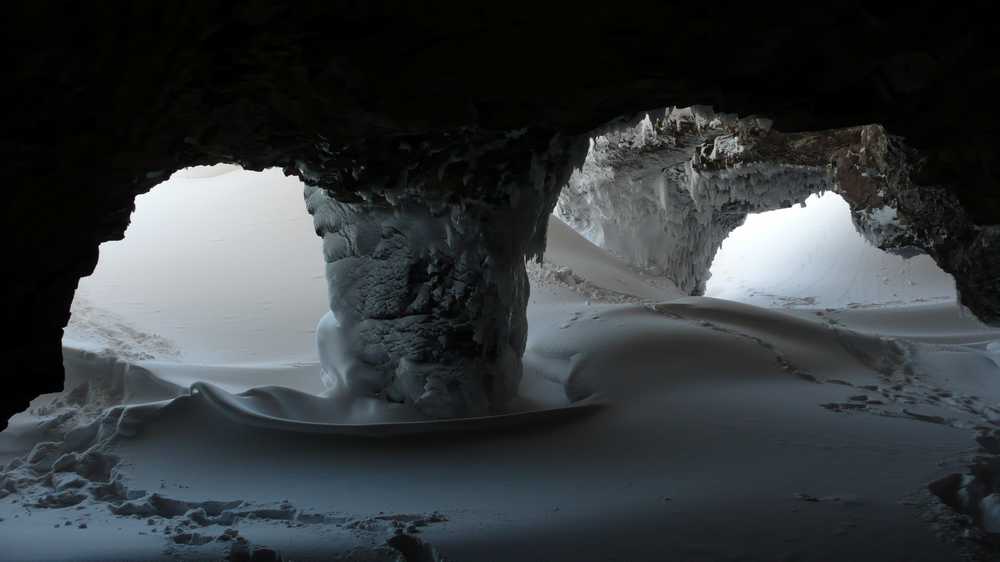
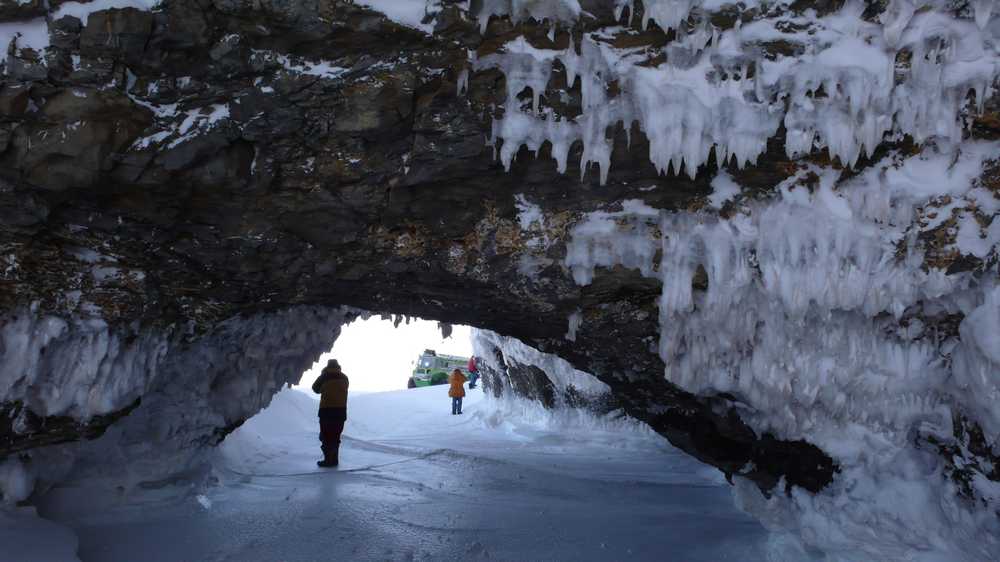
For a week we had no communication. I dislike electronics in general and computers in particular. Naturally they fully reciprocate my feelings. It is a badly neglected case, moreover, burdened by retirement age of the user. After two days of unequal struggle, being finally convinced in own inability, I call to a friend of mine. The computer goes out of operation in my hands plainly and humbly: I press a wrong button, and it goes to the dickens. I did not want to fray nerves of Victor Sklyarov, our computing guru who is anyway loaded by our endless requests above any measure. Finally it started working, to tell the truth - I do not know why, and now we may hope to get again the photos and descriptions of ice condition from the Canadian ice service, AARI (Arctic and Antarctic Research Institute) and from the Americans. The perfect ice condition in 2013 in the straits of Canadian Arctic Archipelago created in us an idealistic perception that this year everything will be just as well, and we will ride along smooth ice easily and merrily, covering 200-250 km per day. Never mind, the more pleasant will be our return to the Motherland, which in the meantime has grown by such a beautiful constituent entity of the Federation. During the period of our Internet silence, the following has happened: the distance we have traveled from Resolute is 2000 km, the ice hummocks still do not give us a miss, and the stretches of smooth ice are regularly interrupted by testing the strength and terrain-crossing capacity of our vehicles. On the 30th of March we crossed the border of Nunavut province and entered the Northwest Territories. Time difference with Moscow now is 11 hours. Volodya Kruchinin has sent to us a parcel with a pair of spherical joints. It will be waiting for us at Barrow. Oilmen from Exxon Mobil company working on Alaska coast have invited us to be their guests, so we are looking for the bright future in the form of hot shower and a workshop. We have passed the point where a memorable sign was installed at the place of dismantled long-range radar, presently there are only a few concrete foundations and a copper plate with the inscription. Absolute cleanliness, not a single piece of iron or any garbage nearby. Near meridian 120 we passed along steep coast with numerous caves and caverns fancifully decorated with snow cornices and sculptures of the most fantastic shapes. Plastic art beyond the reach of man. Columns are standing inside some caves, narrow creep-holes are connecting the caves, and everywhere you find either a Chinese snow dragon, or a refined elegant bend of the neck and back of a diplodocus, or someone else good-natured and handsome. At the Lion cape we made photos of the sphinx with austere face and a lonely relic pillar in the sea that imperturbably stopped the roll of ice hummocks. In one of tiny caves into which I managed to squeeze through not without difficulty there were plenty of hare’s traces; the creature deftly jumped out from under a snowdrift and raced to the open. I could not catch him for two reasons: a) I had a camera in one hand, and b) I nearly died of fright and unexpectedness. Yesterday evening we passed Paulatuk, a local center of civilization. All of sudden the folks have gathered, and we conducted a short meeting with the toiling masses of the North. A local gentleman showed us the snowmobile paths on the map, and we bid farewell to the inquisitive northerners. The distance to Tuktoyktuk village is about 400 km, to Barrow in Alaska -1500. Today’s weather is fine: -30°, almost no wind, snowmobile path is there, so, life is good!
Greetings to all and till next communication session, V.Ye.
March 28, 2014.
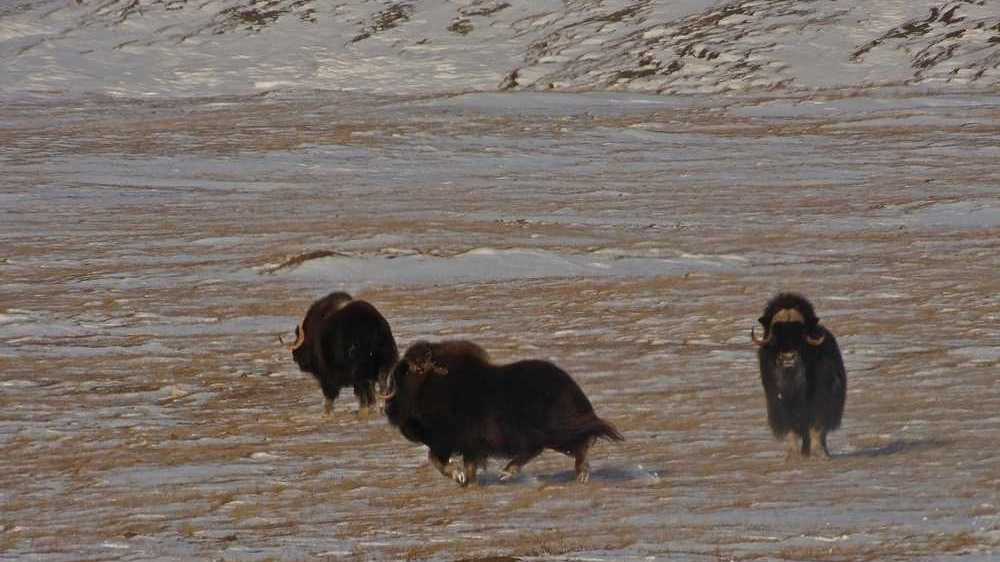

Today in the morning we crossed the last strait before the continent - Dolphin and Union Strait. Now we are traveling along the coast of the continent to Bering Strait. So far the fast ice is not bad, erosion ridges are very hard but not too high, the suspension and tires-shells cope with them quite well. Each caravan carries 900 l of diesel fuel, but the vehicles move cheerfully, in third and fourth gear. Fuel consumption strongly depends upon terrain and varies from 25 to 45 liters per 100 km. We saw musk-oxen, they were like shaggy blocks far away. They are hunted for: we passed a hunters' lodge with a heap of skulls of these poor creatures nearby. The lodge was not plundered by bears; either there are none of them in this region, or they had been lucidly explained that plundering is no good. Hares, and there are plenty of them, are so snow-white that we see them only when they run away. The weather is fine, -30 deg., the wind is weak, visibility is good. There are plenty of snowmobile traces, but until now we saw no humans in tundra. Abandoned oil-extraction sites are met along the coast. Tundra near them is perfectly clean, not a single piece of iron lies around. Once again we had to repair the fork of the towing device, then we repaired the spherical joint using a big hammer, and it was really repaired. Will it hold on for long? Greetings to all! V.Ye.
March 26, 2014.
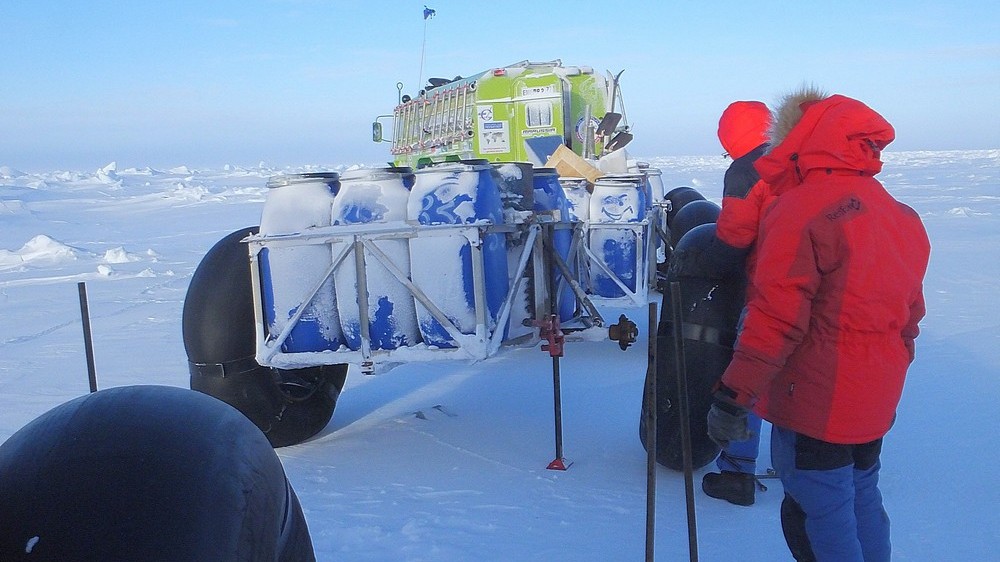
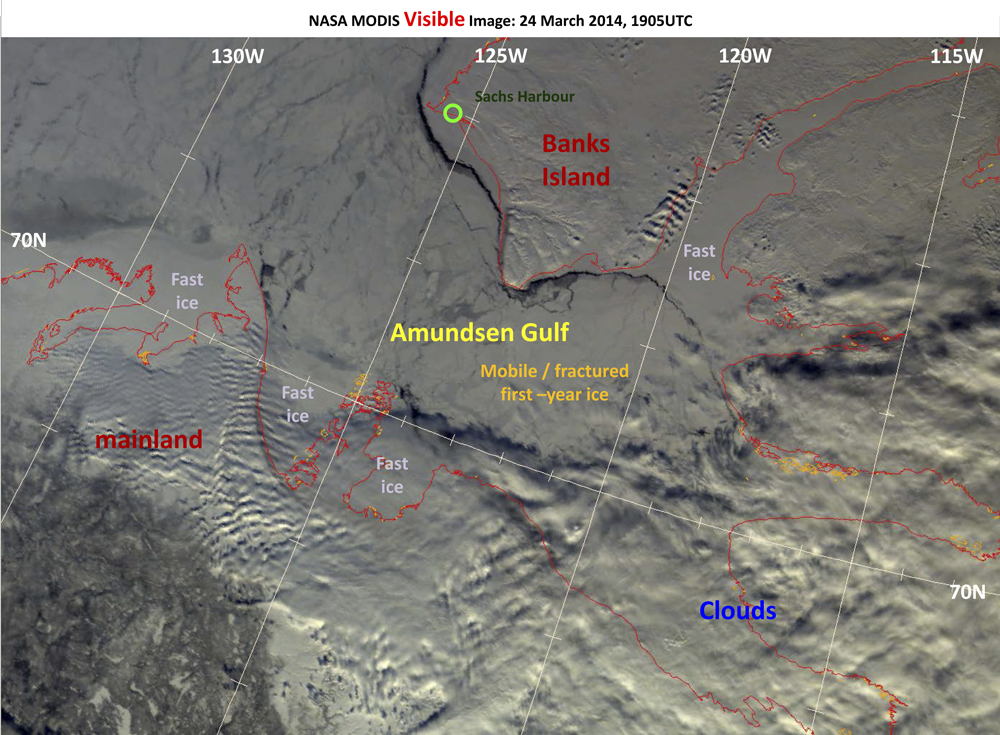
N68°28,703', W112°09,024' We are staying at the Western estuary of Edinburg Channel. Daily distance: 173 km. Incidents: your humble servant flew into a passion at good terrain (i.e. ice) and, overlooking a snow drift, raised the caravan into air. The consequence of thoughtfulness which is unallowable for the team leader was breakage of tow-bar of the rear trailer. This experimental drawbar manufactured from duralumin tube, strongly corroded by saline oceanic water during the last year travel, failed after such mishandling. Repair lasted two hours, then lunch, delicious as ever, with spices, which composition is kept under the strictest secret. The cook disclosed some of ingredients, but judging by his sly looks, misinformation should not be ruled out. It is tasty, that’s the point. At the end of the travel the investigative torture might be used, he has no alternative and he’ll squeak, but right now he may enjoy the scenery and the fresh air. Then we met good ice again, Vladimir Nikolayevich is behind the wheel, therefore we are moving without any mishaps. The day is clear, the wind became a little quieter, but still it is soundly scalding the face. Closer to the evening the coast became more picturesque, steep and high. Kind-hearted lady Troody from the Canadian ice service has helpfully sent us the photos of ice condition at Dolphin and Union Strait. From the satellite orbit all the terrestrial problems, including the ice condition, seem small, as if you were looking at them through the binoculars from the reverse side. The main point is: not to turn it the correct side as long as possible. The next shop on our route is in Tuktoyaktuk (or simply Tuk), which is 875 km far measuring by a straight line, and in reality it will be around 1200 km. Of course not near by local measures, but not in the middle of nowhere. All in all, the objective is set, and we aspire towards it, that is the main thing. All the best, and till next communication session. Yours V.Ye.
March 25, 2014.
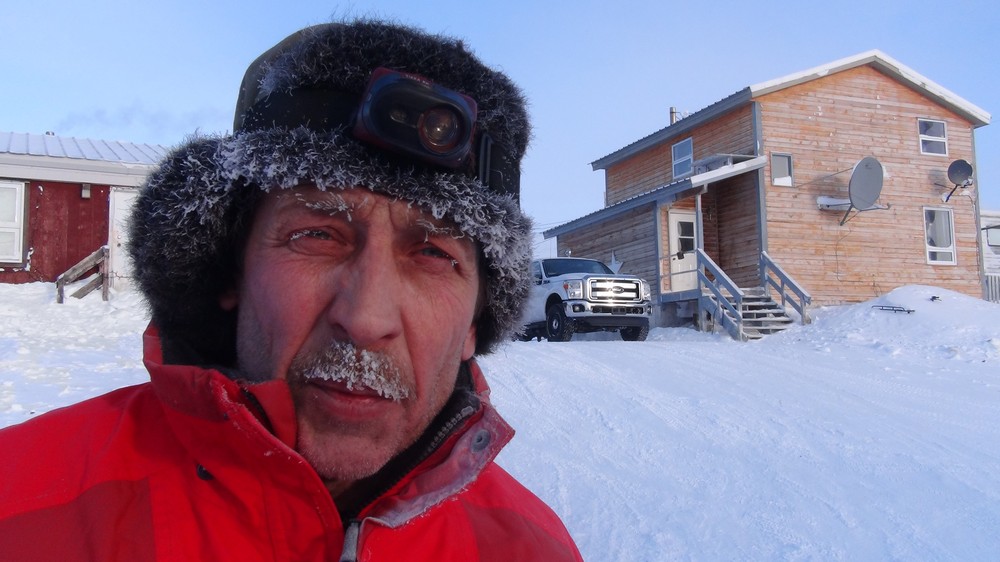

Yesterday at midday we solemnly arrived to Cambridge Bay. The settlement is large - 1400 residents, several times larger than Resolute. We were lucky: immediately after arrival we found a local for interrogation, and he showed us a door where diesel fuel could be bought. Behind the door was the office of a geological prospecting company, its chief had worked as a geologist for three years in Khabarovsk Territory. His reminiscences about our country were quite cordial, except for borsch [beetroot and cabbage soup], which he had to eat every day during those three years. They offered coffee to us, called for the fuel tanker, showed where shower was, notified that lunch is at half past one and asked to come in time. During lunch we were informed that there is a big garage with a good workshop in the neighboring building, and we are allowed to work there. By about 7 p.m. we were ready for moving, and soon we departed. And here the embarrassment of the day occurred. The matter is that before lunch a local journalist came to us and asked for an interview; we made an appointment for seven o'clock. We waited in vain until half past seven, assumed that something went wrong with the gentleman, and we drove away. And only about half an hour later I remembered that Cambridge Bay is located already in the next time zone to the West, and we departed one hour earlier than the appointment time. And today we traveled 113 km and stopped because of break of a shock-absorber rod. Some water got inside the shock-absorber, it froze, and at a good tussock the rod broke. We have some spare rods, so it is not too bad. As for the living creatures – we saw ptarmigans and three polar wolves busily trotting along the coast of the island at the downwind side. They paid hardly any attention to us – too busy. While a polar fox bolted away at full speed. After all, it is the 69th degree of latitude; the territory is quite suitable for life of feathered as well as tailed creatures. That's how the matters are. It is still windy outboard, -30 deg., and low drifting snow. Greetings to all, and till next communication session. V.Ye.
March 23, 2014.
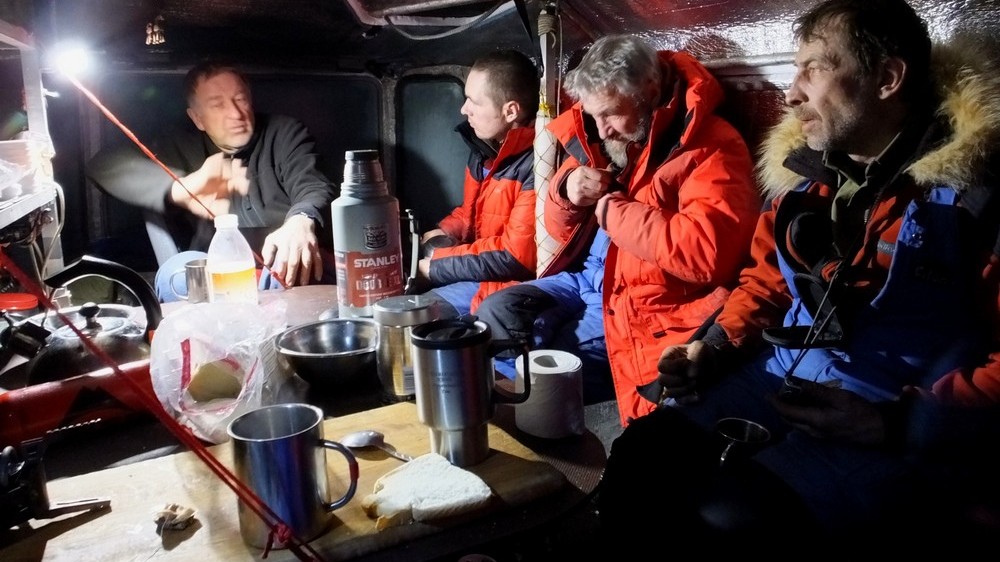
Odometer reading 981 km, day’s distance 97 km. All the day intense low drifting snow is combined with white-out, we are driving on instruments. Today is the day of resting from endless admiring of Arctic beauties, in order to regain the sensory acuity in full measure. So, we spent Sunday usefully, I even had some time to think about the eternal; other team members also thought about it. Nobody had any desire to go outdoors from our movable cell, the wind 15 m/sec certainly is not the stormy wind, but together with temperature minus 25-30 degrees it does not encourage for taking a walk. All in all it is not too bad, we are falling behind the schedule, but becalm ourselves as follows: it is better seen from above – when to add ice hummocks, or when to switch-on the blizzard. Now it is 11 p.m., wake-up tomorrow at 5 a.m., so goodbye to everybody, till next communication session. V.Ye.
March 22, 2014.
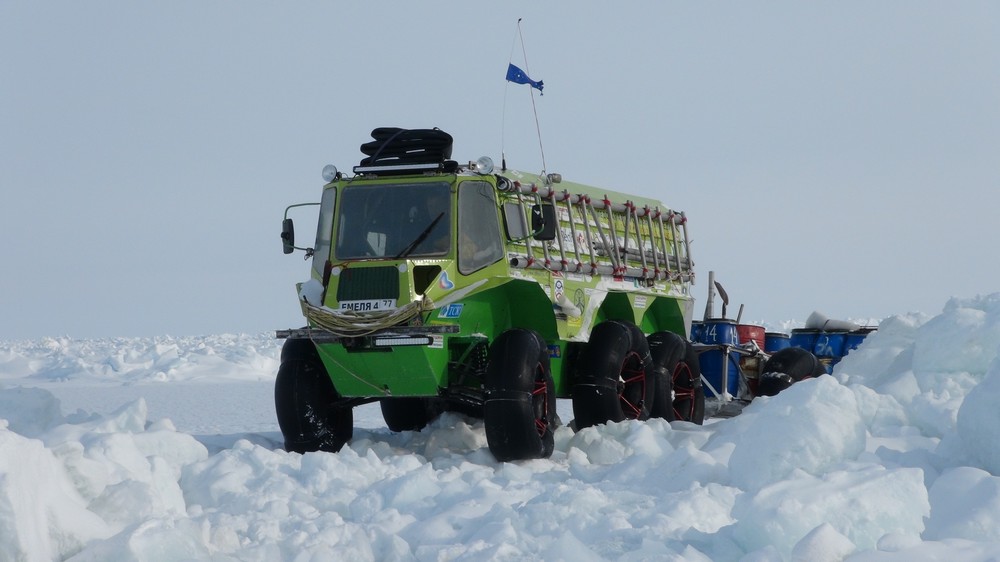
Odometer reading 875 km. Day’s distance 78 km, of which 1,9 km were traveled from 8:00 till 13:30, and the reminder 76,1 km – during the rest of the day. Actually we were very lucky: in the morning we went on foot for searching the way to the wished-for coast, and came across a fresh, newly-frozen break in the field of continuous hummocking. Our vehicles’ width precisely fit for squeezing through this cross-cut. Most probably that without this pathway we would have spent another night among ice hummocks as well. But everything is well observed from above, and thus we ride along smooth ice in the direction of the nearest shop which is, so to say, not far - just about two hundred kilometers. We need bread (not the substance you thought about) and sugar. At the same time we will refuel and send the photos. The weather is windy and clear, -30°C. Greetings to all. V.Ye.
March 21, 2014.
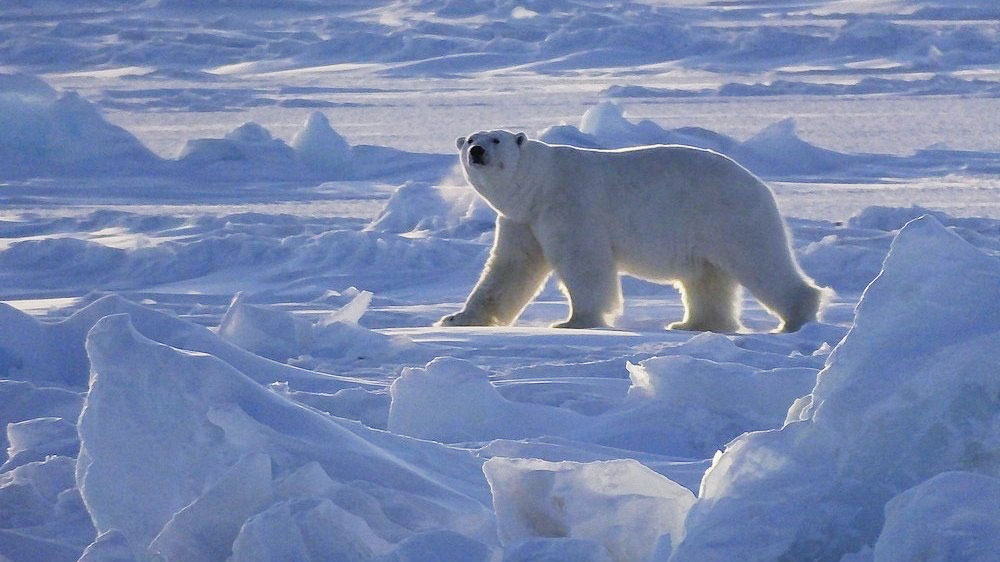
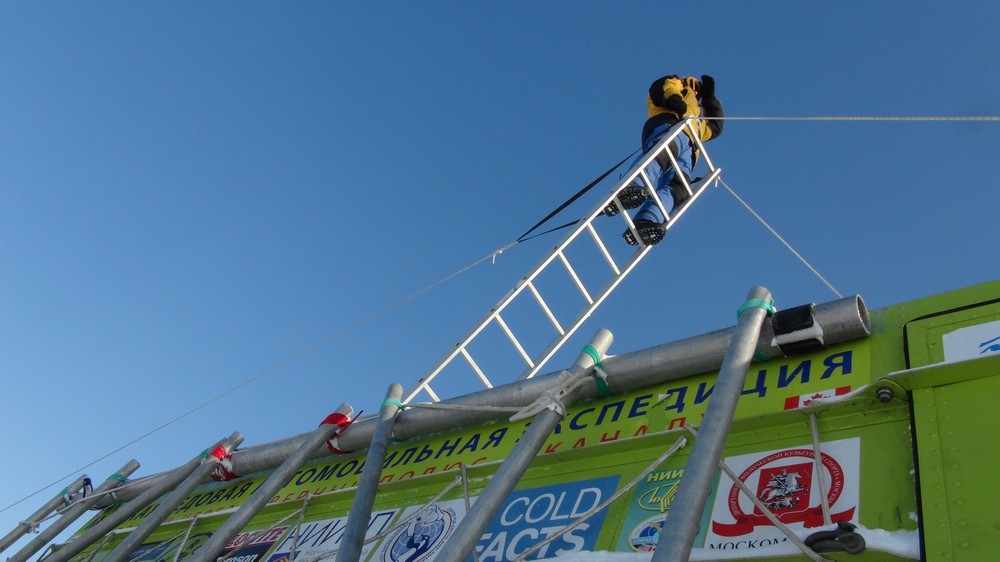
Today we woke-up in due time, at 5.00, started movement at 7.20. Ice hummocks accompanied us all the day. The dominant of the day were two exercises – improvement of ice-pick working skills, and climbing on the roof of the green vehicle for the purpose of finding the passages. Today a polar bear visited us. Nikolay Nikolayevich Kozlov observed him attentively, and was brief in his appraisal: a worthy animal. The handsome creature was good in all aspects: clean, well-nourished, behaving with dignity, in general - in the prime of life. He did not show excessive intrusiveness, just found a trench about 80 meters from us and rested there, hoping for a chance if someone moves far enough from the noisy piece of iron. But we did not move far, demonstrating in every possible way our courage and valiant boldness standing on the roofs of the vehicles and recalling with gratitude comrades from the United States of North America and from Canada who at the last moment managed to deliver to us the permit for import of weapons (that is the true source of our valiant boldness). After admiring each other for long enough, the esteemed parties departed, each its own way. We turned to the exercises in destruction of ice hummocks, while the "master of taiga" started examining the seal's holes. Our schedule of the day is: at 6.00 - light breakfast, at 21.30 - light supper, and one coffee-break for 15 minutes at midday. This way it is here, in austerity. By the end of the day we were tired, and received a gift from providence for our diligence: a recently frozen river, a break covered by fresh, perfectly smooth ice. At full speed in an instant we passed about 10 kilometers along it and stopped for night. Plenty of bear traces of various sizes are around. Recently frozen river – hence, thin ice, and seal under it, the dream of a bear, and our barrels with foodstuffs are also here, so at night the invasion of bears may occur, maybe it is reasonable to arrange the guard duty. So that's how things are. Greetings to all. V.Ye.
March 20, 2014.
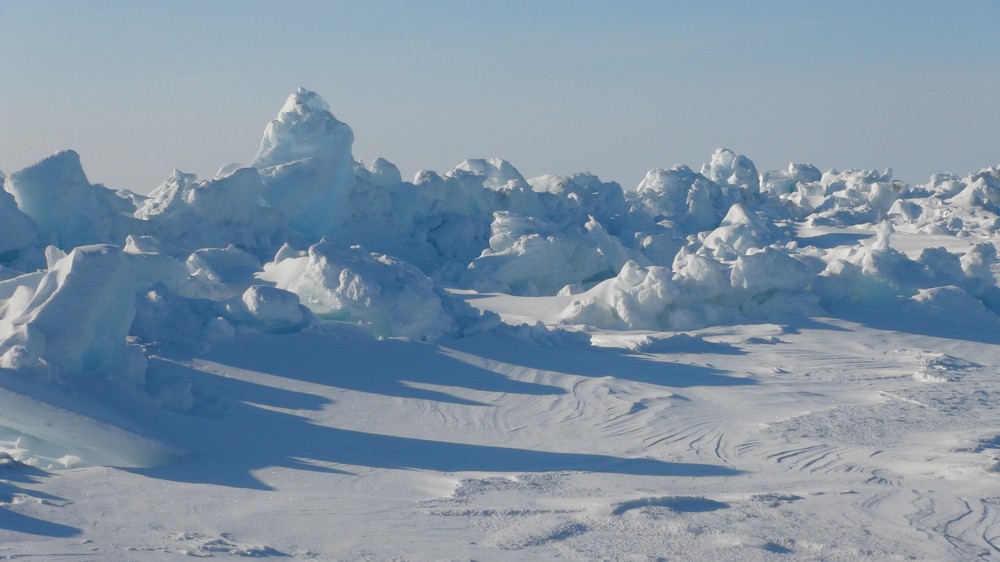

The daily distance is 40 km, and even that thanks only to sufficiently good terrain for some time in the morning. And then it became like in the open ocean, and not at the easiest places. This time the Canadians have prepared better, they hold defense seriously. On the other hand, we somewhat relaxed, thinking that the straits always are in perfect condition, like during the last year. The vehicles are riding steadily, pleasing us. Today we had to work with the ice-picks, by the way, at first it was hard, we fell out of habit and became lazy during the past week. Riding all the time, either sitting or lying, especially when you wish to think about the eternal; and while you are thinking about it, you lose the physical fitness. Hence – either the eternal, or the good health. Alas, they are calling for supper, and I have to finish urgently; you may guess by yourself, what is at risk if I am late.
Greetings to all, and till next communication session. V.Ye.
March 18, 2014.
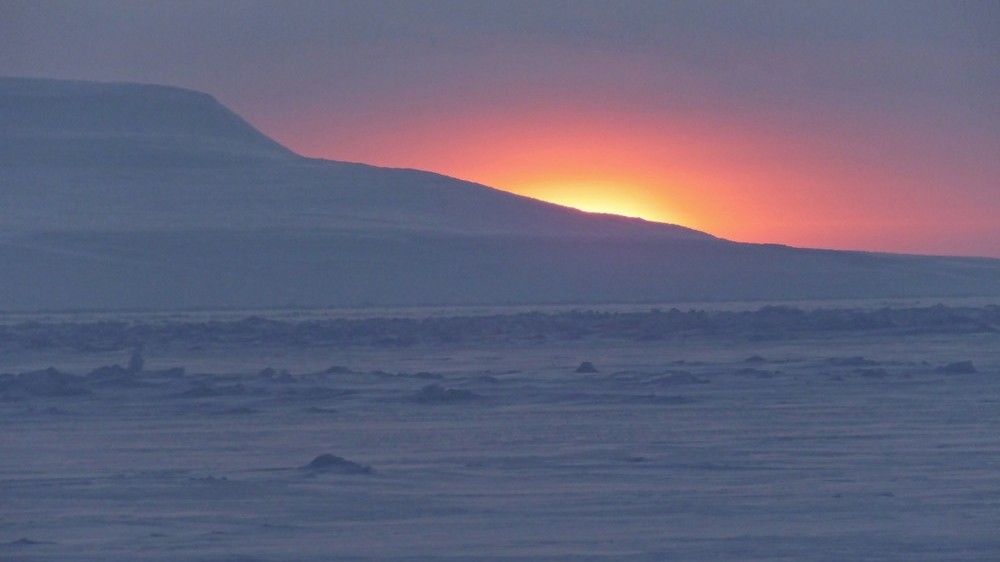
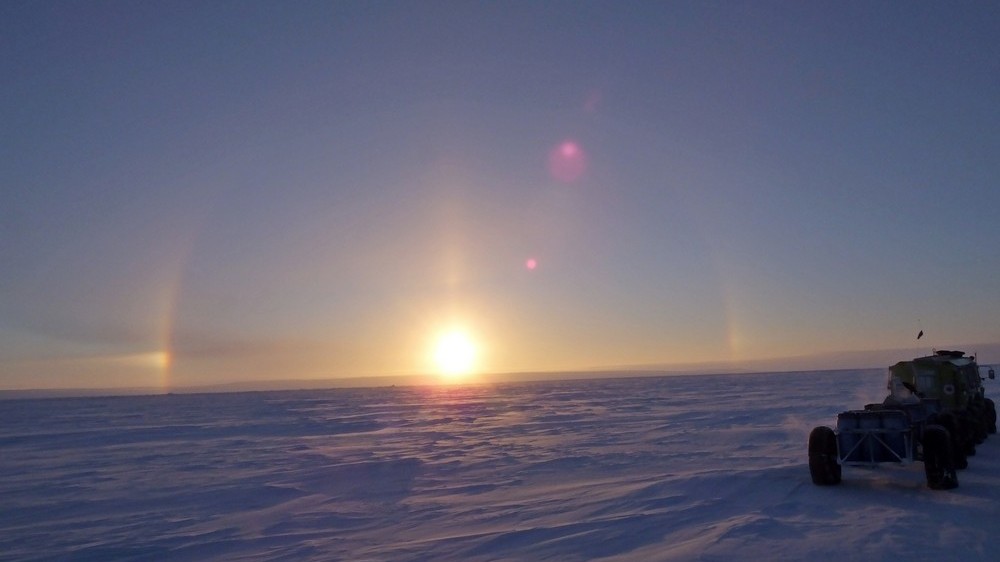
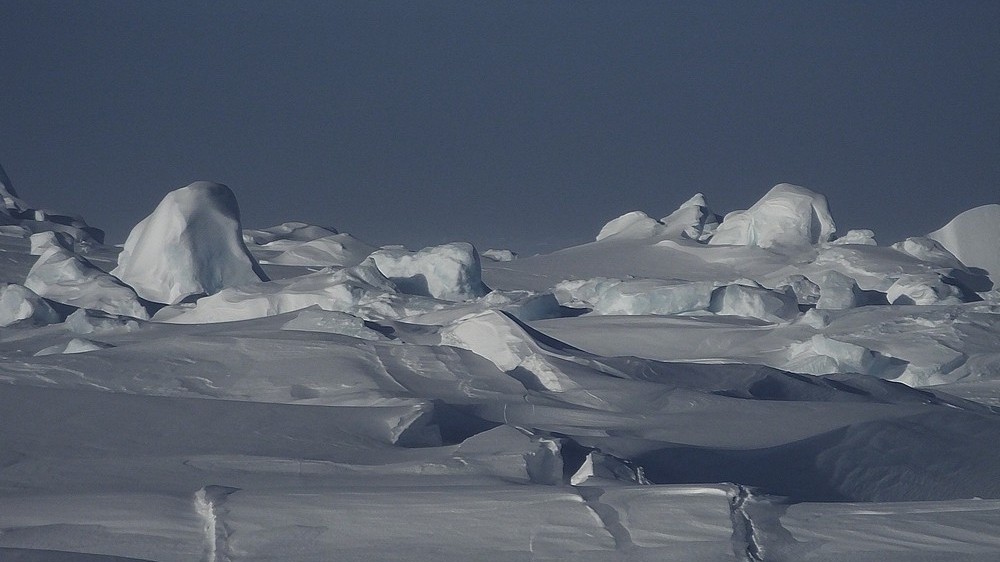
Odometer reading 664 km, day’s distance 100 km.
The morning started from whiteout, that very phenomenon which has no name in the language of Goethe and Schiller. They don’t have it, while we do, be sure!
30 km we moved at pedestrian pace, then it became easier, then a trailer broke off, alas, not for the first time and not for the last. Some coupling components brought from Moscow turned out to be made of brittle sorts of steel, and crack one after another. It is not very far from Cambridge Bay settlement, and we hope to eliminate there the faults brought from home, the more so as the job is not very big, and it will be not very difficult to repair it.
Driving became much better when it was dark, especially as the terrain is not very complicated and does not necessitate panoramic survey of the surroundings from the ladder. The bright light of our headlamps is quite enough for choosing the way among snow piles and snowdrifts, sometimes of enormous size. We are grateful to Prolight light devices. At night we saw a juvenile bear, Kolya Kozlov knowingly declared that it was a she-bear. We did not investigate it in more detail, there is no spare time – we must hurry to Motherland, such extraordinary events take place there, while we are loafing about here.
What is especially interesting in Canada? That’s it: for us, as a rule, the full moon is associated with good clear weather, while here this rule is not observed. Generally speaking, they do with the weather what they wish. Sort of disorder, but the locals, apparently, got used, adapted to it. For example, let us take the owner of a small local ice-breaker, Mike.
During the shipping season he clears the passage for the vessels performing the Northern Delivery (they also do it, like in Russia), and when it is completed (and it happens soon) he throws a glance to the native icy desert and heads for charter work to Bahamas where he is unmercifully exploited almost the entire year by diver archeologists investigating the sunken ancient galleons and other vessels which had transported gold.
That is the way he is passing the time, feeling homesick.
With compliments from the crossing of straits: Peel Sound, M'Clintock Channel and Victoria Strait,
Vasily Yelagin.
March 17, 2014.
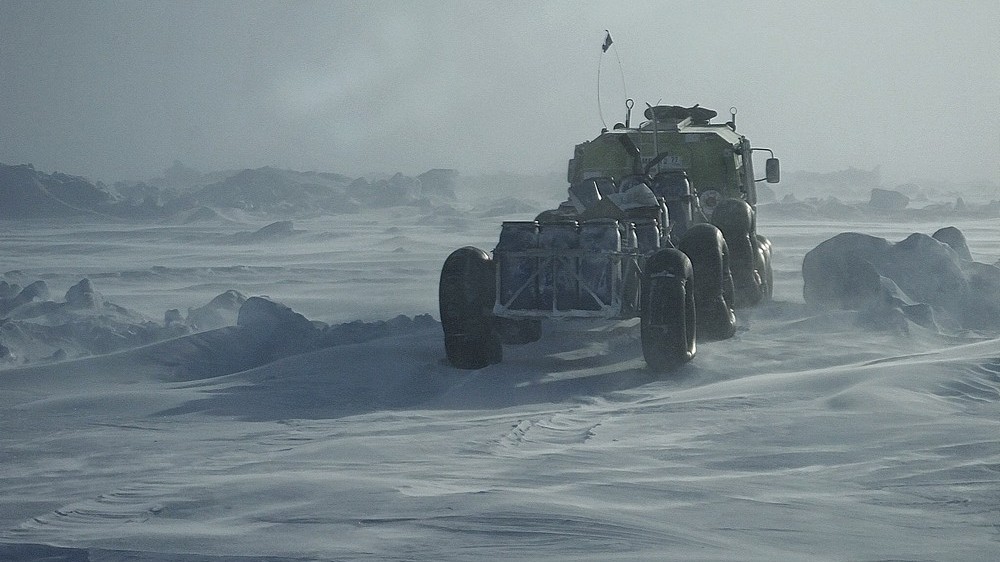
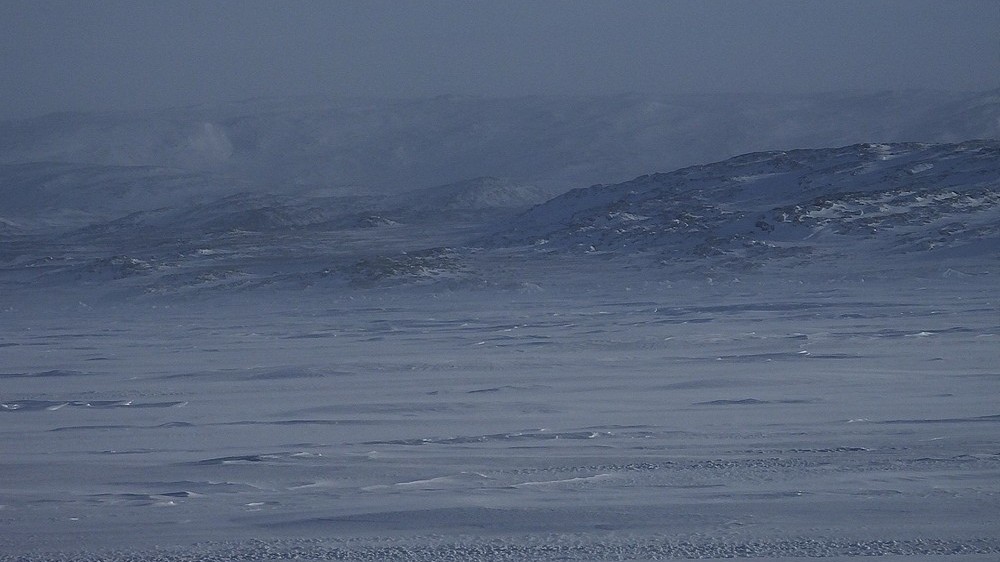
Greetings to all, all, all. The person on duty today has overslept, therefore we started only at 7:45. At first it was not too bad, but then haziness came, and the driving became really interesting. We switched-on all lighting devices, including LED "bars" of incredible capacity. But even such astronomical amount of lumens helped quite moderately. The point is, that the whiteout and high illumination intensity in the white stillness are not at all mutually exclusive things, and therefore our beam of light forms barely observable shadows, thanks to which we see the surrounding world. Do you know what is the English equivalent of Russian "belaya mgla"? Whiteout! I captiously asked a German lad, but he could not tell me, what is the equivalent in the language of Goethe and Schiller. Then this “Out” came to the end, and the travel became more cheerful. The result – modest 95 km during the day, however, there were many ice hummocks of moderate nastiness. Beautiful frosty sunset decorated the procedure of replacing (at frost with wind) the torn wheel straps left from the last year. We are thrifty people, and overwear the socks completely. The mechanics are satisfied with the Canadian diesel fuel - fatty and at the same time does not get thick. In a word – we are on the move. Greetings to all. Vasily Yelagin.
March 16, 2014.
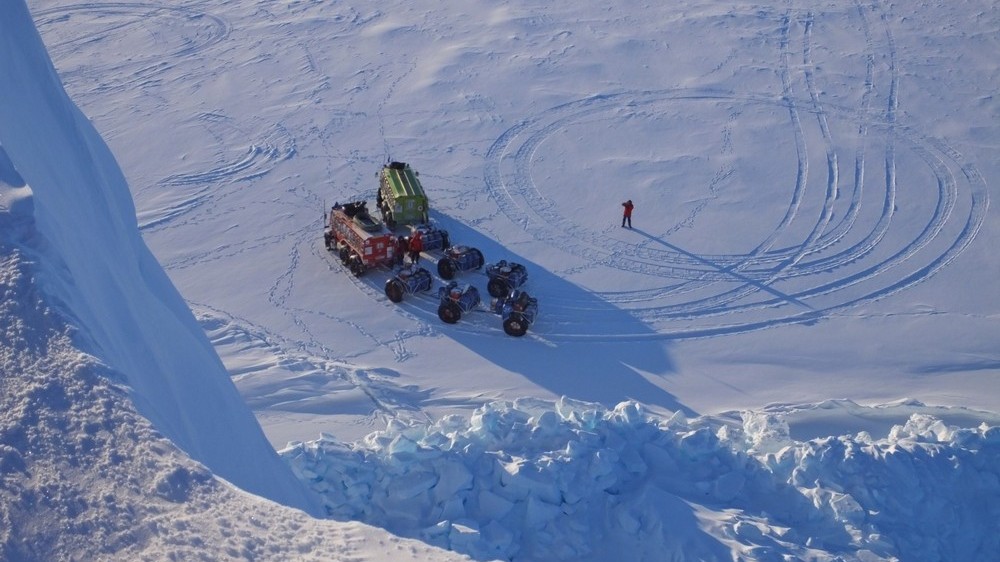
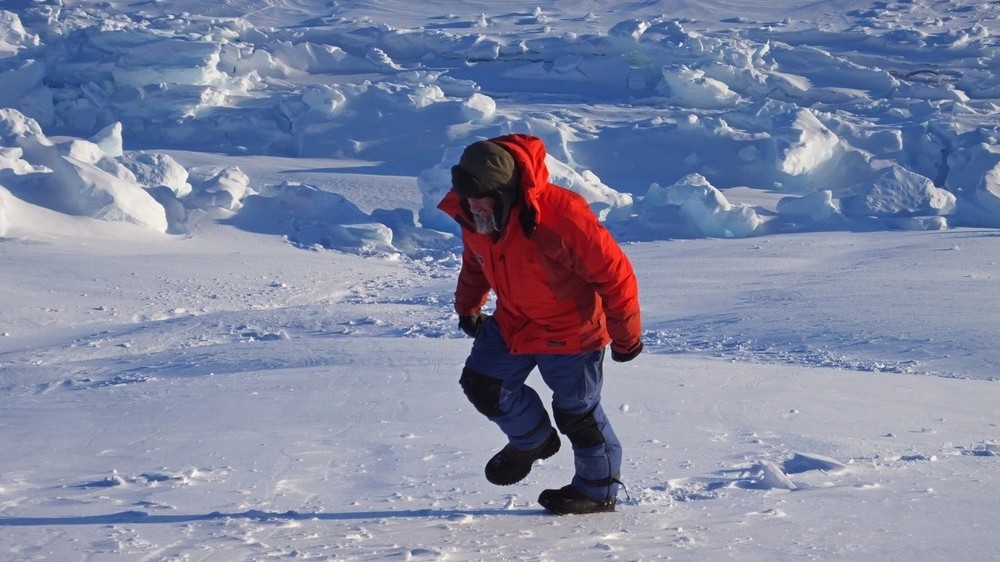
Coordinates of the night stay: 71°33,360 N, 096°59,207 W. Odometer reading 430 km. During the day we covered 140 km. Today we woke up early, at 5.00, thanks to Ivan Kuzhelivsky, telephone conversation with him has been appointed at 3.30 (our local time). The quality of communication was awful, the satellite was permanently lost, after all we managed to talk somehow, however, then my desire to sleep was gone, and being aggrieved that all the others were enjoying a balmy sleep, I arranged an early wake-up to THEM. There was a certain positive effect (not to count for the respective mood of the participants), because at 7.15 we were already moving. There was haze before the sunrise, we were driving literally by the feel, with yellow headlights on, but about 10 o’clock the visibility improved. The whole day we moved fast, on the 4th gear, but in the evening we met ice hummocks, just like in the open ocean. The hummocks cooled off our ardent impulse to drive at night. We made photos of the picturesque sunset and turned to routine matters: check oil level, fodder the cattle, and do not forget about yourself. It became warmer, at daytime it was -27°. In the evening the wind quieted down, and it became just as at a resort. In the afternoon the suspension spring of the green vehicle has failed, it had to be replaced, then it was necessary to have tea, as a result 2 hours were lost, or else we could increase the day's run by 40-50 km more.
Greetings to all! V.Ye.
March 14, 2014.

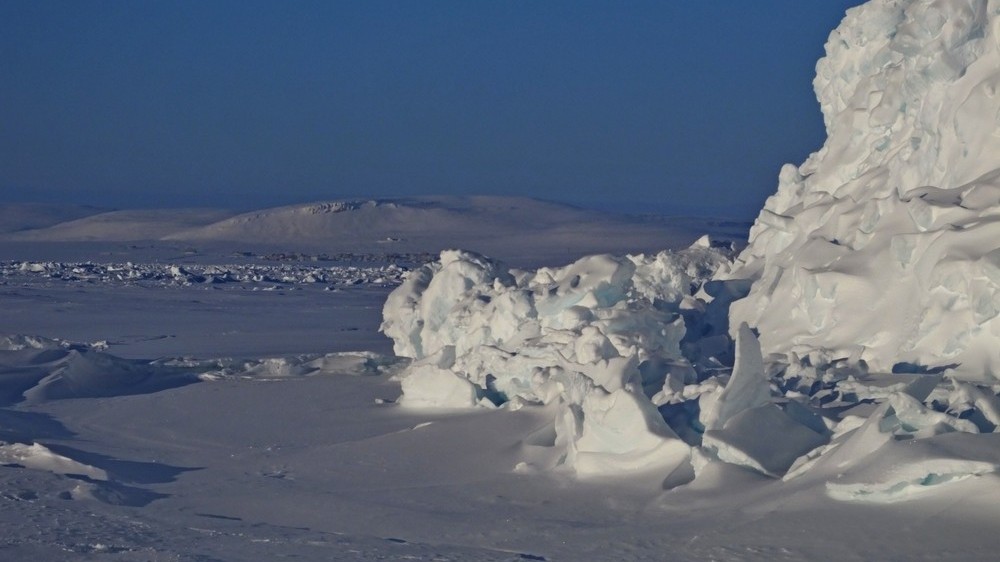
73°38,082N, 095°53,967W, Odometer reading 183 km, temperature -35°, wind rather strong, it is necessary to monitor the cheeks and noses all the time. We are 124 km from Resolute village. Day’s kilometrage is 87 km, 2,5 hours were spent for repair of hitch device at the rear trailer of green caravan. Low drifting snow, visibility about 300 m, making difficult the choice of route among ice hummocks. The size of hummocks is quite considerable, but the vehicles are coping them almost without assistance of ice-picks in the mighty hands of Arctic romantics. We ride in a magic world; the snow flows along the ground in swift brooklets, sometimes even in streams, with remarkable diligence forming “zastrugi” (erosion ridges) which are so unloved by us, and not only by us. In a confidential conversation one local resident has told us that the military have delivered from the continent 20 large sleds for towing by snowmobiles. Probably they are intending to patrol the border. Quite right, or else the guys wearing “ushankas” on Yemelyas might arrive while the border is open… Trouble might occur then. At our Motherland even a fly cannot arrive unchecked, not to say about anybody on low-pressure tires. The local gentleman was swearing not because the competent authorities want to guard and to patrol the territory, but rather because the sleds were to be manufactured at the place where they are not used, and they will have to be delivered by expensive airplane, while diligent Inuits are distressed without work, in anguish spending for foodstuff those additional annual thousands of dollars. In this respect all the military men of all countries are similar to each other, even when they are situated on opposite sides of the ocean. Maybe it is better still to live in friendship?
Vasily Yelagin. From Peel Sound Strait.
March 13, 2014.
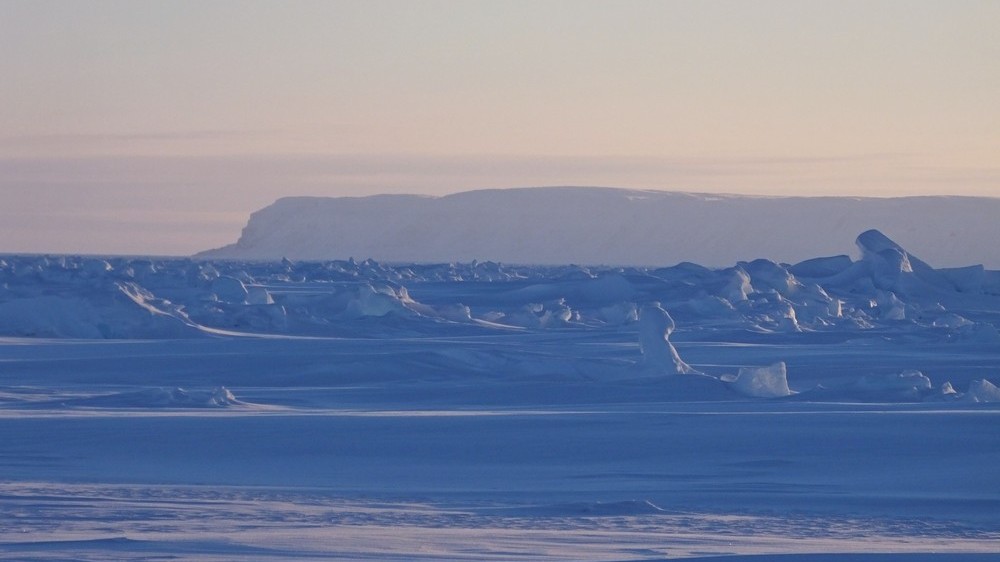
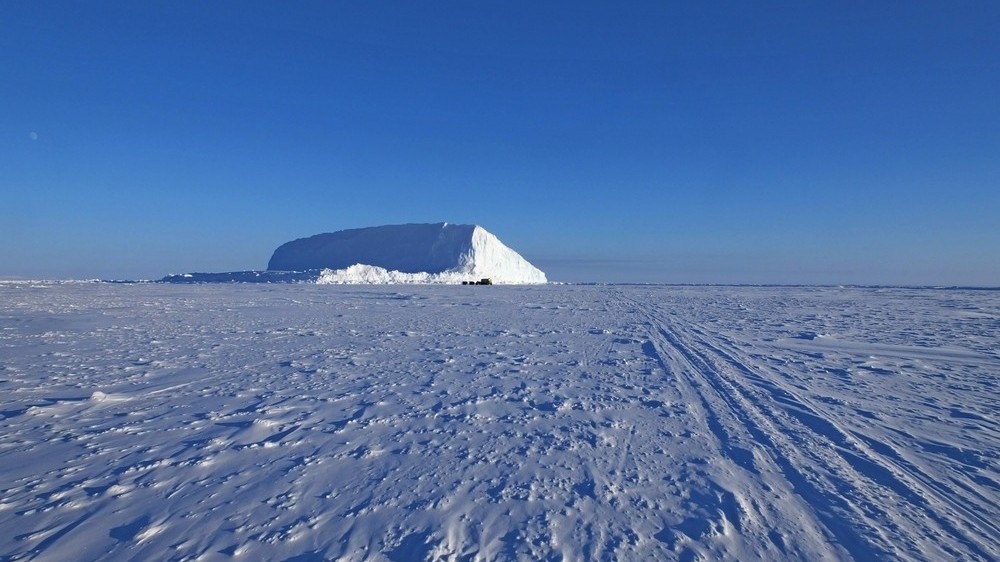
2nd overnight stop, coordinates: 74°21,813 N, 095°54,405 W. Odometer reading 97 km.
Yesterday we have traveled quite a little, about 50 km, due to late start from Resolute village, while today at first the hitch device of the green caravan has broken, then we spent much time receiving messages from the Motherland and satellite photographs from the Canadian Ice Service. Only after the fourth attempt I managed to get the photos. After the Canadians have briefed us on the topic of ice condition in local Arctic water zones, almost unanimously we decided to follow their advice and to travel by the longer route, via Queen Maud Gulf and Coronation Gulf in the direction of Amundsen Gulf (just appreciate the names!). I must state that on the first travel day our perceptions as of May of the last year were absolutely knocked over; at that time we were lucky to drive fifteen hundred kilometers through the straits of Canadian archipelago without encountering a single worthy ridge of ice hummocks. However, today we made just 47 km, considerably straining the vehicles with very heavy trailers. Each vehicle tows 1000 l of fuel only, not to count for spare parts and other things. Volodya Kuptsov delights us with excellent meals in the evenings, explaining in detail their exceptional qualities, so that we can in full measure appreciate not only his cooking skills and dedication but also his great human care for us. In the evening it became colder, and the vehicles that were cheerfully running along sections of flat ice in the fourth gear, by the end of day were capable of moving only in the second gear. The parking heater does no create enough homely comfort inside the vehicle, we have to burn the primus stove; it becomes warmer, but less oxygen and much noise, as if you were sitting in Moscow apartment with windows facing Sadovoye Kol’tso street. Full moon is soon, we’ll see, perhaps something will change. Such are our matters here, in the so-called Canada.
Vasily Yelagin.
March 11, 2014.
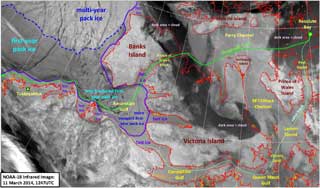
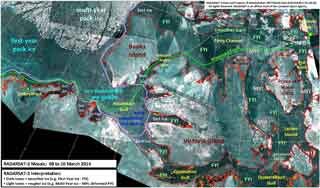
Resolute Bay to Tuktoyaktuk
Prepared by the Canadian Ice Service, 11 March 2014.
Summary of ice conditions:
Infrared imagery shows that:
The ice in Amundsen Gulf is mobile this year, not land-fast.
The pack ice in the central part of Amundsen Gulf is highly fractured
and mobile at this time, the result of easterly wind events causing the
ice to diverge westwards. The ice in the eastern-most part of Amundsen
Gulf is somewhat more compact and less fractured, however, and may
possibly be navigable with the MLAE vehicles.
Radarsat imagery shows that:
Significant areas of rough Multi-Year Ice exist within the land?fast ice
in the Canadian Arctic Archipelago.
The main MYI areas are in central Parry Channel (i.e. Viscount Melville
Sound + western Barrow Strait) and in M’Clintock Inlet, where large areas
of up to 8/10 MYI concentration can be found. Secondary MYI areas are
found in Peel Sound and Franklin Strait where MYI concentrations of ~2/10
exist.
Primary Concerns:
1) Amundsen Gulf: A route from Resolute Bay through Parry Channel and Prince
of Wales Strait is shorter, and allows for the avoidance of the bulk of
the rough MYI in Parry Channel, but there is no clear safe way across
Amundsen Gulf at this time. While it may be possible to follow the coastal
land-fast ice clockwise around the Gulf, there are sections where the
width of the fast ice narrows to less than 200m and is not even visible on
ScanSar imagery. However, the first-year pack ice in the eastern-most part
of Amundsen Gulf appears to be more compact and less fractured than that
in the central part of the Gulf: it may therefore be possible for the MLAE
vehicles to navigate through this area, but the risks would need to be
properly assessed.
2) Peel Sound to Coronation Gulf: A route from Resolute Bay through Peel
Sound - Larsen Sound – Queen Maud Gulf – Coronation Gulf is safer because
there is no need to cross Amundsen Gulf, but it is much longer and there
are sections of very rough MYI in the northern parts that would have to be
crossed.
Wohlleben,Trudy
March 10, 2014.
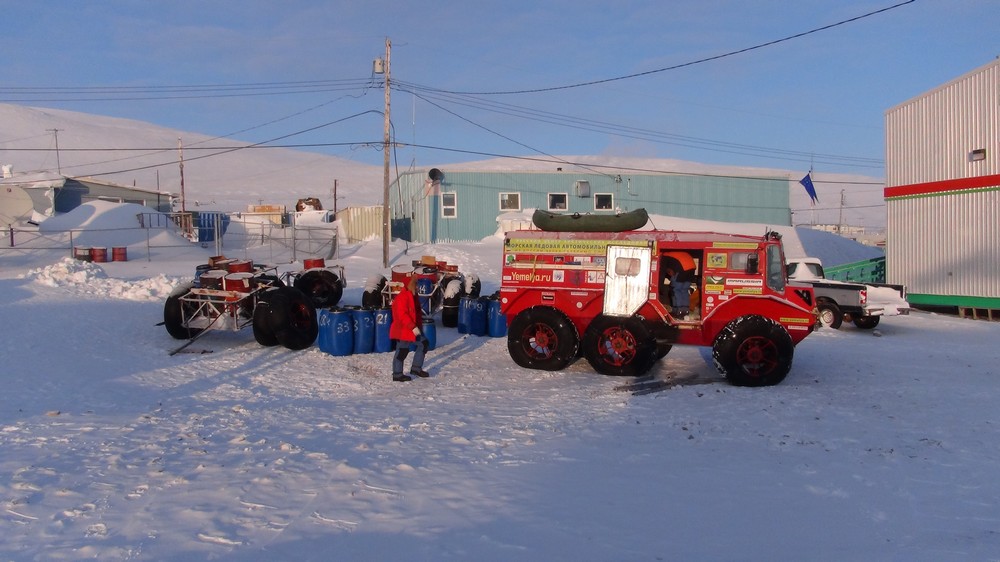
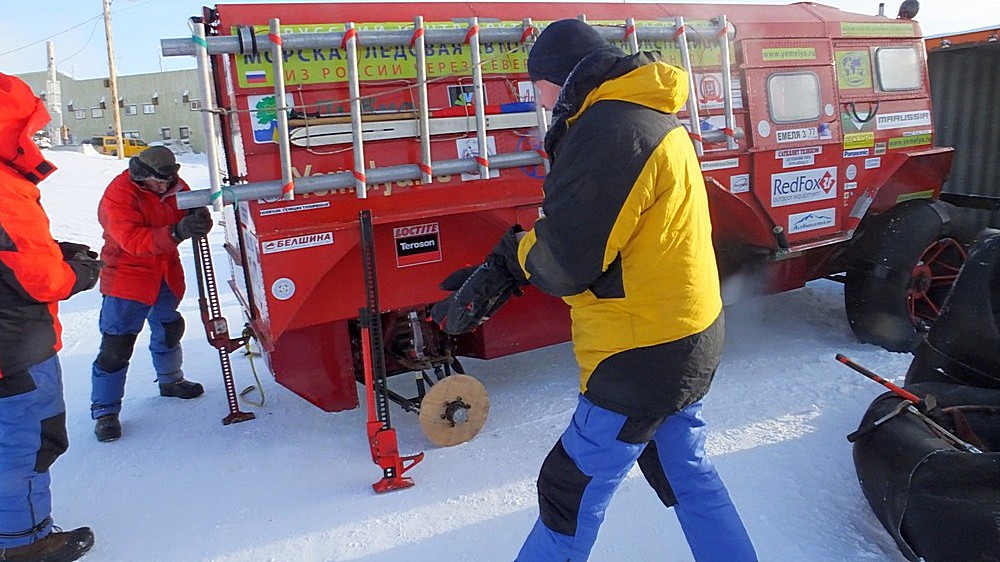
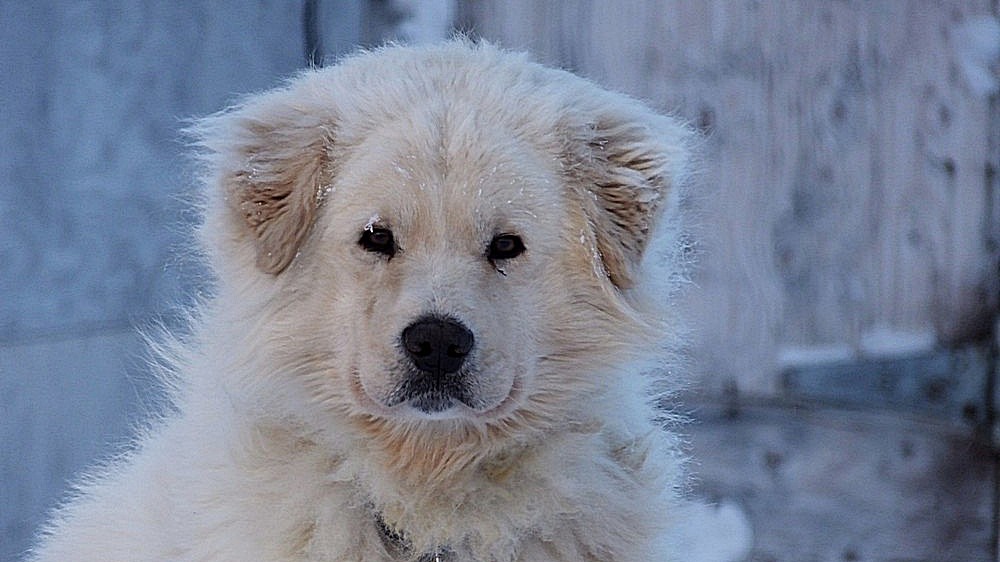
Our second working day in Resolute has ended. The dreams of driving-off tomorrow have dissolved like fugacious smoke in the frosty air of high Arctic. Since morning we were busy arranging caravans, forming the rations and stocktaking. The disaster has fallen, as it always happens, unexpectedly, from round the corner and from behind: as one of the classics called it, the «inventory of the case» was lost. In practice this means that it is necessary to take out the contents of 30 barrels, to unwind all the packs and to record everything scrupulously. The work needs a lot of time and, most important, a specific state of mind. All this takes place at ambient temperature well below 30°. In the morning, during the visit to the local shop, I experienced a stress (“acute situational reaction”) – a roll of toilet paper costs 400 rub., one liter of fuel for primus stove – 900 rub. How the working people of the North survive here is highly questionable. Later I was informed: just only for residing here, each of these working people receives 30.000 dollars per year from the government. So, our demand in fuel is 1L/day, duration of the expedition - 60-70 days, and no benefit payments to us. I phoned to Mike Stephens, our merry acquaintance since the last year; he assisted us providing plywood for making technologic wheels necessary for driving the vehicles into maritime containers. That piece of plywood had romantic origin – somebody has died, and while making the coffin Mike determined its dimensions not quite correctly and had to rework it, and the remaining piece he presented to us – we made excellent wheels from it. This time again he did not leave us to the mercy of fate, after my complaints about the prices he phoned to the petroleum storage depot and inquired about the price of fuel for piston-engined airplanes. It is also expensive, but 14 times cheaper than in the shop, so this time again we were lucky enough. At the present moment the trailers are on wheels, the vehicles are in running order, the food is being packed, so we hope to depart the day after tomorrow. Regretfully, we cannot avoid the fourth night stay at the glorious Inns North hotel, and the expedition’s purse will become lighter by one and a half thousand of local dollars. Today I made a trip to the airport, where my computer has finally coupled with the worldwide web, and I sent necessary letters with requests for providing satellite photographs and descriptions of ice conditions on the route of our caravan. While sending such letters, I always remember the first pathfinders who started in the unknown having only a sextant and a chronometer. There is one common thing uniting them and our expedition, in particular, me; namely, the extraordinary instability of my relations with any electronic devices, which, as soon as I approach, start making all sorts of things except the necessary ones. So, this time the intrigue will continue till the finish of the journey.
Compliments to everybody from the glorious settlement of Resolute, Vasily Yelagin.
The 9th of March, 2014.
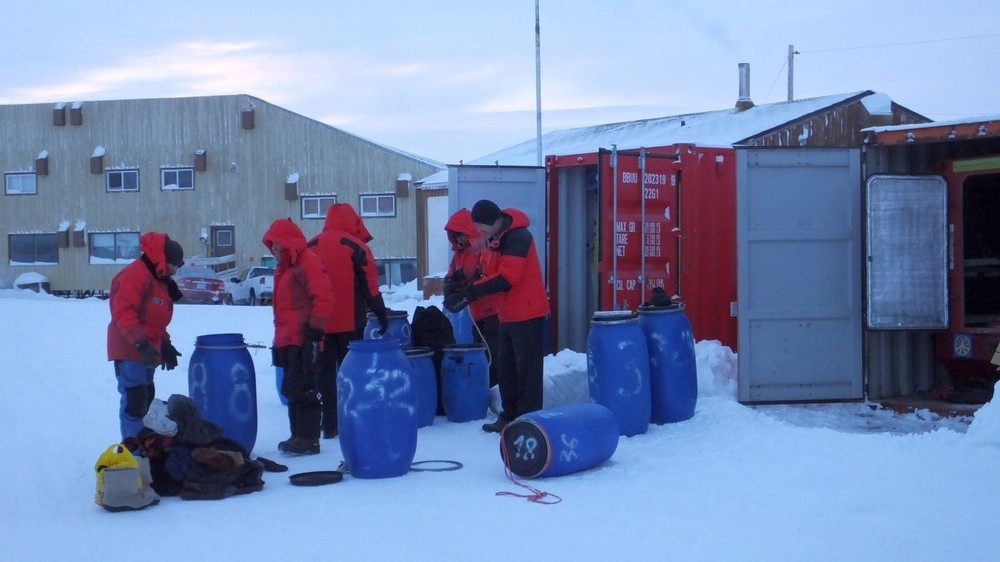
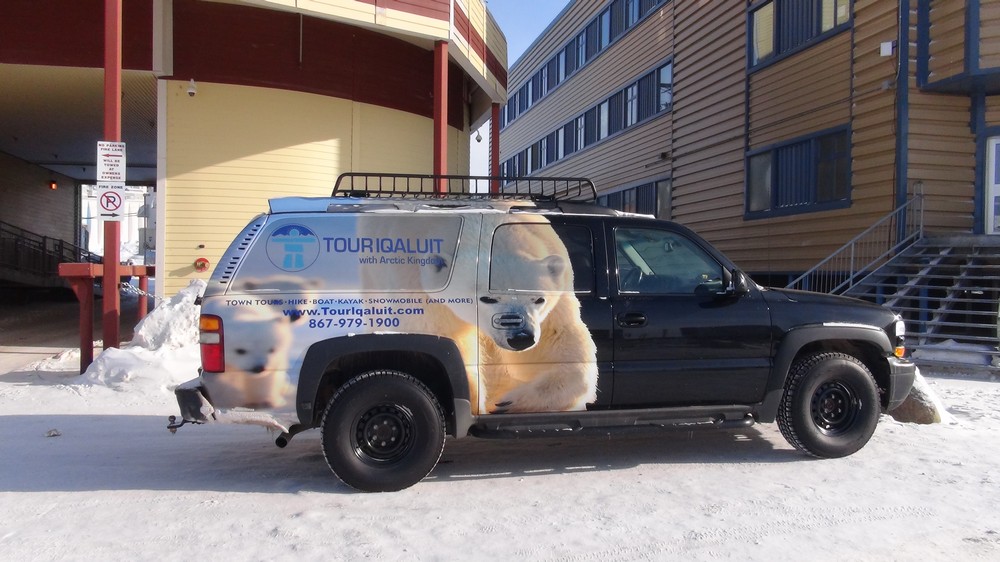
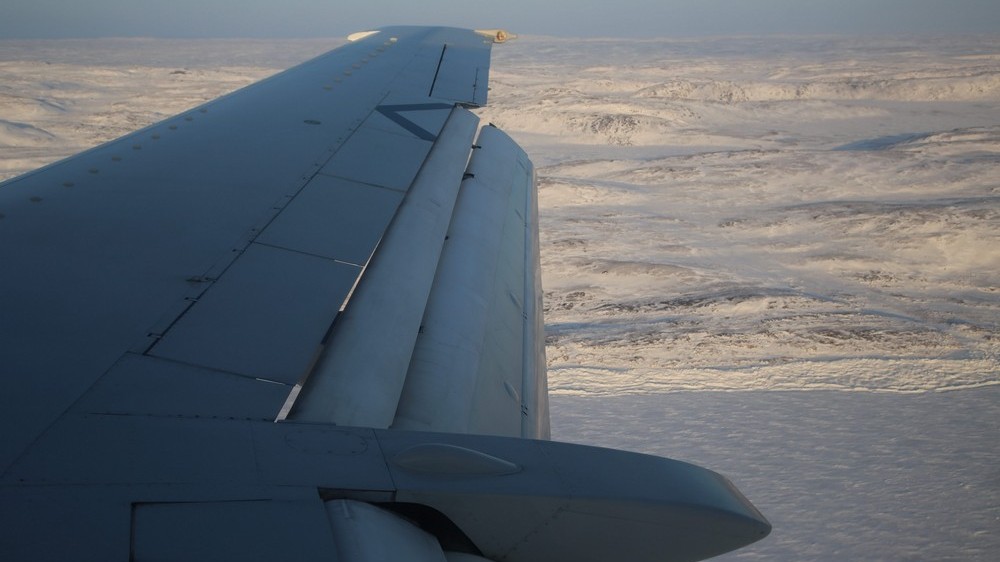
Coordinate N 74° 43,11', W095° 0,69', UTC -4, Resolute. Odometer 0 km. (6810 km. from point of start MLAE-2011)
Yesterday we have arrived to Resolute. The flight from Iqaluit had two landings, at Hall Beach and at Arctic Bay. So, in order to get from Moscow to Resolute, we have taken off and landed six times. Our old acquaintances, Steve and Matt, meet us. We checked-in at the hotel, and accommodation there by itself is a bit depressing, minding the price: 500 dollars per night for a double room. Here, eight hundred kilometers to the North from the polar circle, everything is as before: the same frightful chicken on the plate and the bread resembling cotton wool. Local residents eat the same, maintaining cheerful mood and benevolence even towards us, touring Russians. In the mourning I went straight to the containers, saw them and nearly shed tears from joy, because their appearance for me is steadily associated with a specific mode of life. The engines start easily, the vehicles get out from the containers, we pack the load, assemble the caravans. The day is fine, clear, windless, frost in the morning is minus 37 degrees Celsius, we endure it quite well. We pump the wheels, all 24 of them, the volume of each is about 600 liters. The pump is hand-operated, so we do not feel cold. Two young Norwegians are also here, they intend to go to the Pole; in my view, a bit too late. They will start from Ward Hunt island. Vladimir Nikolayevich [Obikhod] is appointed as the accountant and controller of food stuff, everybody around him are going on tiptoes, full of respect. The technical problems are: to fix the front axle gearbox of the green vehicle; it seems that the previous year one of the axle shafts was close to breaking, and today it failed when driving out from the container. A polar fox is busily trotting around the settlement between the houses. Local dogs are barking and even chasing it, but it is obvious that they do this just for the sake of appearance, after all the animal also is a local resident.
Greetings to all, Vasily Yelagin.
The 5 th of March, 2014
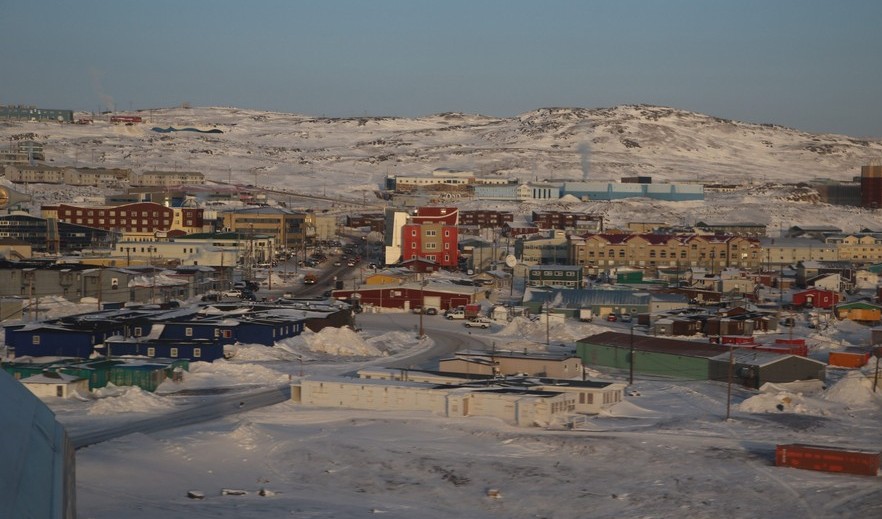
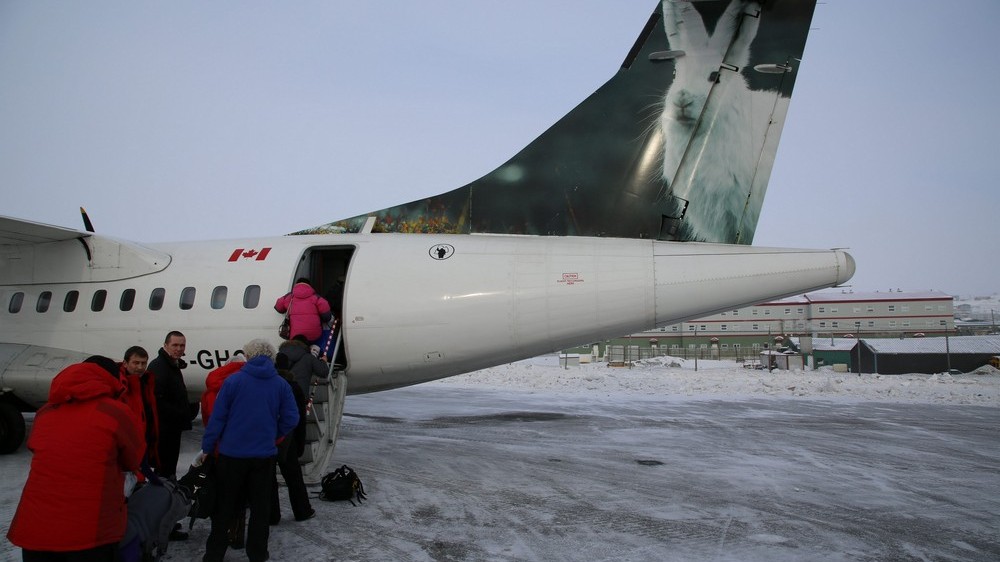

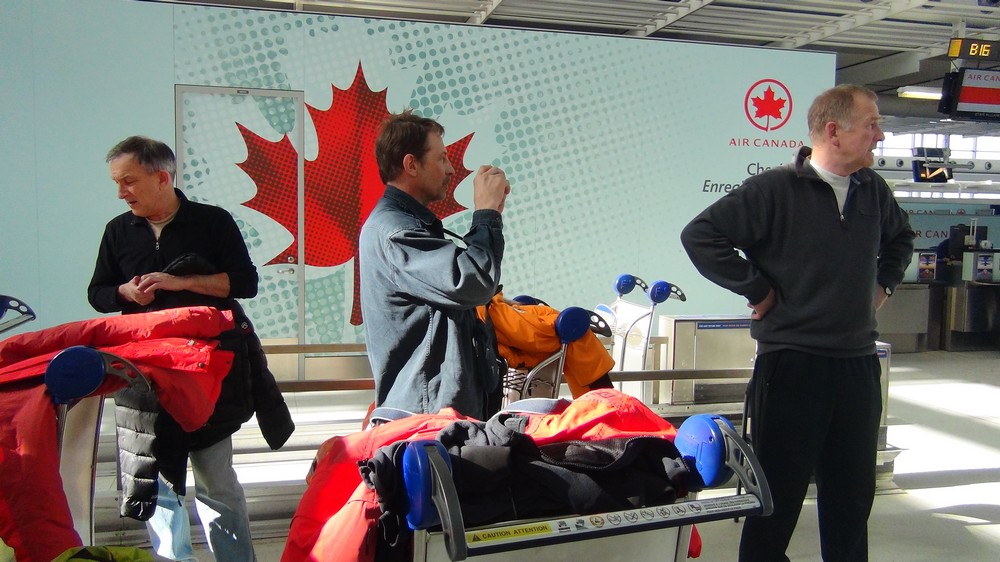
Coordinate N 55° 58,85', E037° 24,62', 11:00 (UTC +4). Odometer 0 km. Moscow.
The 5 th of March, Sheremetyevo; our bunch is complete. We repack our bags, adjusting their weight to the allowed 23 kilos. Free-of-charge norm – one pack of baggage 23 kg, and 10 kg to the cabin. Try to squeeze into this limit everything what might be necessary in high Arctic latitudes for the period of two and a half months. Once again I lose the battle with the members for weight cutting: we have so many different pieces of iron, greases, and equipment over 60 kg, and surely, the loving relatives had shoved plenty of warm clothing. The customs officer, a young lady, is busy with formalities related to weapons; tonight, just a few hours before leaving for the airport, the permit for temporary importing of weapons was received from the Americans. In the region of the Bering Strait and Wrangel Island the number of polar bears is substantially higher than the population of Homo Sapiens, and I am not absolutely sure that each and all of them, seeing and smelling our caravan, stinking with sweat and diesel oil, will feel fastidious enough. Our airplane is flying right above Greenland, but continuous cloudiness below does not allow us to see the largest island on the globe, glistering with glaciers.
In Toronto we have a trans-shipment further to Ottawa. In the Canadian capital we are met by friends from the embassy, and first of all – by Igor Girenko. It is impossible to overestimate the assistance and moral support provided by the staff of diplomatic corps, both in Ottawa and in Washington. Flight connection in Toronto is less than two hours, and I am somewhat nervous about managing the weapons formalities, but highly experienced Girenko promised to arrange a reinforcement in the shape of vice consul Andrey Molochkov. The reinforcement soon became necessary, and how! At first there was a queue on the border checkpoint, then – in the customs “red corridor”. Our flight successfully departs, and a benevolent lady behind Air Canada check-in counter announces that the number of tickets sold for flights to Ottawa exceeds the number of seats available, and even the passengers who were not late are unable to depart. The vice-consul gets engaged in the action, and calls to some fairy at Aeroflot. The comrade knows an IT underground passage, in several minutes he finds six (!) tickets, and, followed by envious glances of the others, we depart with the next flight.
In Ottawa we will stay for a day and a half, buy foodstuffs, and on the 7th of March we will move further to Iqaluit, the megalopolis of Inuits country. In Nunavut province, as it is named, the population density is quite comparable with the density of Antarctica population. At two and a half millions of square kilometers of primeval nature – less than one hundred kilometers of motor roads.
This year there are six of us: four “old beans” - Kozlov, Obikhod, Shkrabkin and the author of these lines. The “novice” Vladimir Kuptsov plays the role of a creative specialist, he has rich experience of film-shooting in the Himalayas and other big mountains. Sergey Isayev, with sad eyes, was among the people bidding farewell, his family matters did not let him start the travel with us; we hope that he will manage to re-join us at Barrow, just before the most challenging section of the route of this year – the Bering Strait. His experience and energy would be very useful to us.
On the 8th of March we depart to the nice settlement Resolute, where, suffocating in congestion and darkness of maritime containers, the trusted friends are waiting to us – the Yemelyas. Delightful winter weather is now in Resolute, about minus 40 degrees Celsius, sunny, in one word - delight.
Greetings to all, Vasily Yelagin.